#but it really shows how law is so weird and nuanced which is why there's always so much trouble and how lawyers can find loopholes and shit
Text
Not me having a whole post explaining why Rita can't legally arrest Racles bc of Yanma's prank only for the internet to go wonky and not have it posted...
Summary:
Via legal nuance, Yanma technically took justice for his attempted murder into his own hands rather than waiting for Rita to go through the entire legal process.
Having him tell Racles to kneel and apologize even for a prank voided Rita's legal procedures as it's his declaration of serving justice.
Rita is rightfully pissed off as they've waited 18-19 episodes to arrest Racles considering all he's done. Now it's thrown out the window because the attack on Ishabana and Bugnarok taking over Shugoddom delayed their 2nd attempt at arrest.
#i really had a whole post but it just went missing#no draft left#just gone#UGH#but Rita is also at fault bc telling Yanma to wait for them to go through legal procedures qould give him the advantage which is giving bias#but it really shows how law is so weird and nuanced which is why there's always so much trouble and how lawyers can find loopholes and shit#kingohger#king ohger#ohsama sentai kingohger#rita kaniska#rita kanisuka#yanma gast#yanma gust
47 notes
·
View notes
Note
although i am definetly elucien,i want to put one thing out there-elucien is not confirmed,neither is gwynriel or elriel for that matter because i honestly feel like miss janet will just go with the most popular ship at that point of time for the next book, and the reason why sooooo much ships even exist is because she has no idea wtf she is doing and just does whatever for aesthetic,cuz she has a huge cult- i mean fanbase who will buy and support whatever peice if shit she writes.....like idek what is going on at this point,we satrted with tension b/w cas,az and mor, cuz cas hooked up with his so called bff's crush loooooooooong ago in their 500 years of useless life,then he gives a long winded explanation in acosf of why he had to "kill" any sort of feelings for mor,but for some reason she still "takes his breath away" and he gifts her lingerie for christmas.....i am not even opening that can of worms,then we have this tension b/w az and mor but turns out mor is gay for some reason,then elain has a beatuful,hot,intelligent and tortured mate but we have tension b/w a cardboard cut out az and elain......sometimes there are scenes b/w them that indicate they can end up together(a nightmare really,but it might possible since sarah thinks it's important that every family member live in the same city) but elain never really rejected her hot mate and some scenes show she might actually care about him and then we have az who has this mentality of a 10 year old who wants the the same toys as his friends(three brothers,three sister mentality) and suddenly we have tension between him and another girl who he trains.......did i miss smth??like what even is going on here!!!! it's as if she wants got level complicated relationship,though she could never even in seven lifetimes ever pull off smth like that cuz she doesn't have that level of nuance or creativity,it's obvious she was not going for that but it smh ended up being like that which just shows the level of this author's impulsiveness and lack of intricate thinking........it's just indian soap opera minus the mother in law
SJM is really weird about making chosen families, especially in ACOTAR. I don't know why she made everyone into each other. That Mor being gay thing was a retcon and makes very little sense to me. I think it would make more sense for any of the Archerons to be gay, or even Gwyn and Emerie, but that's what happens with straight white authors sometimes. They make the most random characters gay for "representation," but they have no idea what they're doing.
As for that bonus chapter, I do think it was a little bit of fan service to include the "elriel" part as well as convenient for her plot to push Azriel into Gwyn's arms and Elain into Lucien's arms, because after ACOWAR she had compared Elain and Azriel to siblings, but someone must have told her about the popular elriel ship and that was her response. Before ACOFAS, Elriel wasn't even a possibility in the author's view. I still think it's a very low possibility based on how the BC was arranged, but it could technically happen, in which case I will never pick up a SJM book again.
But...not to give SJM a ton of credit or anything, but she tends to go in whatever route she wants to go regardless of who the loudest fans are. She gave Chaol a book in a time when Chaol was highly unpopular in the fandom (not for me, I never stopped loving that man) and it turned out to be her best written book ever. So I don't think Azriel being super popular or Elriel fans being the loudest (not the most popular) will have an impact on the next book's ship. It makes little to no sense to me for her to go in the Elriel direction, especially after she made Lucien think Jesminda was his mate for so long, then was initially going to make Nesta his mate, only to have him wind up with a different Archeron sister. After all that, plus everything she put him through, to give him a rejected mate? Bah, not happening. Lucien is her Jamie Fraser inspired character, she loves him regardless of what certain fans in the fandom might think. And she has always been a fated mates writer.
I am crying at the Indian soap opera comparison because ACOTAR does feel like that at times with the cringey drama and sexual tension🤣🤣🤣🤣🤣. I do think ACOTAR is too heavily romance focused which is why TOG is SJM's best written series.
7 notes
·
View notes
Note
Relationships (even happy ones) aren't 100% perfect and I'm really happy you're depicting some personal conflict between the main couple without hamming it up. After all everyone has disagreements, and Storm and Hope both raised some valid points about their completely contrasting lifestyles (Even if on Hope's end she got a bad instance of it, which is likely why Storm seems to generalize them; definitely a bad thing to do, but given Storm was seeing Hope and seems to have had the Grove be her exposure to prides, I don't fault her for thinking all of them are like that) and how it can be hard to just suddenly settle in and agree with everything about said lifestyles, 'specially as a social species, even if Storm isn't saying everything.. hm.. I actually wonder what she held back. Either way it's nice to see! Especially in a climate of the internet at times where apparently disagreements are seen as bad for couples (no fr I've seen that, it's weird and on the same level as people thinking relationships without fights and spice and drama all the time are boring and completely unengaging which makes me, a lover of simple undramatic couples that communicate even a little instead of mishearing everything the other said, a sad lady :c).
Hopefully they do come to that middle ground sometime, like Hope settles in as a roaming lion with her little group and Storm sees that not every pride is like that like Hope said. You mentioned the Thundering Mountains being a good way to show that nuance, so I cannot wait.
Love Cackler Ma's debut too. I loved her from the get go and love her even more and she didn't even need to say a damn word. :D
I'm thrilled everyone liked Cackler Ma's debut even tho she said nothing! That means we did a scene with its intended effect haha everyone got the idea of who she is pretty quickly.
And YES they definitely have differences they need to work out. Plus Storm wasn't being entirely sensitive to Hope's perspective, along with not sharing her own experiences. Hope's pride did influence her opinion somewhat, but it more buttressed what she already believed, if that makes sense. And when Hope thinks of prides, she thinks of people who take care of each other. Which is what a pride is supposed to do in this world haha They're not an oppressive force whose existence goes against the laws of nature. But Storm definitely has thoughts worth considering on top of the points already made.
But these are the beginnings of an ongoing and evolving conversation between these two. This is the first time they talk about it, but it won't be the last. They'll eventually want what the other wants. They are end-game after all. We want it to be equal parts interesting and equal parts normalizing healthy disagreements (and we also don't want to do character assassination in order to make one seem more right than the other at an awful attempt to show flawed traits while simultaneously ignoring the bigger problem at hand. And leaving the other out in the rain...) which is something lacking in media, particularly queer media.
And we want them being end-game to feel earned. We could always just have them live happily ever after, but if their relationship leaves a bad taste in everyone’s mouth along the way, or it feels like they’re just being forced together, then that’s no good either, know what I mean haha - Cat
16 notes
·
View notes
Text
September 17: Supreme Court
And so Supreme Court Preview comes to an end. I am so exhausted. It was good, though. I’m glad I attended virtually. Attending in-person would have been way too tiring, and, also, I would not have been allowed to yell my thoughts out loud during the panels and if I can’t do that, what is the point?
A few quick thoughts before I probably take a nap. First, though in the past I have taken specific thoughts and ideas from the conference, this time I felt more like it was about the holistic experience. It was very detailed and very heavy, and my knowledge of the law is fairly broad but also fairly shallow. None of this is bad, it’s just how it was for me. I really got a lot of enjoyment out of just being surrounded by law talk. I imagine it’s how cats feel when they sit between people having a conversation and just passively enjoy it. Like, I understood enough for it to be interesting to me, and just observing the passion, the expertise, the complexity of thought, and the strong community of it was a good experience. It stretched my brain and it reminded me of why I love the whole law thing. Even though many of these topics are discussed in the population generally, the perspective is totally different from within the legal profession/academy. It’s more nuanced, it’s more complex. It’s more personal too. People have relationships with each other. They’re also deeply knowledgeable, and this knowledge provides them with additional or different priorities or concerns. They still have political views, obviously, but they have other priorities and see different details as important. And they all have legal minds and are experts on what I think of as ‘legal thought’ which I’m still not able to describe but which I definitely feel infected my brain permanently over the course of 3 years of law school. It’s just a sort of reasoning style, infused with balancing, reasonableness, arguing from the extremes, and other tricks.
An example of just how intra-community this was: at one point, one of the panelists blanked on a case name (a rarity: people were dropping case names like nothing) and said ‘the one so-and-so argued’ or something like that. Like, yeah, we all know every member of the Supreme Court bar, obviously.
My favorite panel was the federal judges panel. It was really informative as a window into how judges think--so informative that I really did wish literally everyone could see it, even though in the same moment I realized that 99% of Americans would find this deathly boring--and exemplified this ‘law community’ ethos. The judges were different ideologically and they occasionally lightly disagreed, but they all had the same experience of sitting on Federal appellate courts, and having that experience gave them huge common ground. They talked about how hard it was to have cases that were under-lawyered, about wanting more amicus briefs, about always keeping in mind that the parties before them are real people, about the difficulty of interpreting Supreme Court opinions and dealing with uncertain Court precedent, and a lot about their relationships with their colleagues and the need for collegiality, or rather, the natural creation of collegiality when, you know, you’re literally colleagues.
I think my favorite point was about court legitimacy. One of the judges said that he wished there was more reporting, more local papers that could cover courts, and so on, and that what he felt he could do to better the situation was to make his opinions readable and to be transparent in his reasoning--to “show his work” as he said. He said his introductions should read as copy for a paper: who, what, when, where, why; a sixth grader should be able to read it. I’ve long felt that the opacity of the law is the biggest threat to its legitimacy. On a personal level, I wallow in the complexity. I love the puzzles. I love the beauty of seeing a civ pro or appellate procedure problem resolve itself in my brain. But I’m weird like that, and you should not have to spend a combined 7 years in school just to understand what rules govern your day to day life. So I really appreciated his ethos on that, even if I’m sure he and I would disagree on most substantive issues.
In general, people were identified by name and job, law firm name if applicable, but people’s political affiliations weren’t given (not that it was a secret, these are known names, but it wasn’t front and center) and people largely did not speak in terms of their own opinions, or at least, not their opinions about what was right or wrong or what the law should be. Ideology was consistently dis-emphasized. I saw it bleed through a little in the first half of the day (the conservative judge who was obviously a slut for historical analysis and originalism, versus the judge who was like ‘I am skeptical about this historical analysis trend’ for example) and in one or two places there were advocates who were quite vocal about their views. But, like, if you’re representing the NAACP on a panel about affirmative action, there’s no point in hiding your opinion on affirmative action, you know?
But in the second half.... Oh, it was clear. Those were the panels on religion and Dobbs/Bruen and people went hard. I don’t think all of them went as hard as they could have or wanted to but given the general mood of the conference, the fact it was a conference and not an adversary proceeding, and the clear Unspoken Rules about broadcasting your personal views, it was the equivalent of an all out brawl, imo. I really thought Murphy was going to explode at certain points. Even the moderator said she had “no poker face.” And Queen Pam Karlan went pretty strong too, and made some of my favorite points of the day.
Because the mics were not on people but were above the desk where the panel sat, and because the camera wasn’t cut between sessions or immediately after the last one, I could hear some of the discussion happening in the off periods. Not much and it was very in-and-out, but I picked up a little. I could hear some after the last panel that was quite interesting, in particular, my con law professor talking about guns and his tone of voice was...not happy. I think he was basically mocking one of Murphy’s points about how historical analysis was supposed to work. Wish I could have heard more of that.
Anyway. I feel tired but satisfied. I even did some cleaning and stuff in between the panels. I might do some more post rest/nap or I might not. I still have a whole additional day and honestly I’ve already done sooooo much more than I usually do on Saturdays, especially Saturdays after weeks as brutal as last week was. So I am pleased.
0 notes
Note
What do you admire most about Matt Murdock?
I LOVE THIS ASK.
Everything.
Jk.
Selflessness
First and foremost, I love Matt because of his selflessness. He is more selfless by leaps and bounds than any other character in the show. He is so determined to help others that he has committed both his day job and his “night job” to seeking out and aiding people in need. He frames almost every decision not by the question of “How can I make it through the day?” or “What will make me happy/comfortable?” but by the question of, “What will help other people?” And he’s unapologetic about it. I can hardly express how much I love the moments when someone like Claire or Foggy or Karen will lecture him about what he does, and he maintains that as long as people need help, he will still be helping them.
Of course, he can take this too far, bypassing selflessness and becoming self-sacrificial. That’s not good, and ironically makes him less able to help others as he self-destructs. I also think that Matt can be self-absorbed despite being selfless: for example, I think his belief that everything that happens is somehow his fault is a distorted version of pride, and I think his extreme guilt and self-loathing are also signs that he is actually too focused on himself.
But overall, I think he is incredibly selfless, and this is the #1 reason why I have said I aspire to be Matt (or, really, Matt with therapy and a less tragic backstory).
Intelligence
I LOVE AN INTELLIGENT HERO. Sure, the show does some weird stuff with the law, but the overall message is that Matt is a character who values intelligence. He was a nerd as a kid, and he was still a nerd in law school, and after graduation he is still – guess what – a nerd. But (and this ties back to selflessness) he doesn’t use his intelligence for his own personal gain, and certainly never to take advantage for others. He couldn’t stomach working at Landman & Zach and when Foggy was making six figures working for Jeri Hogarth of all people (Foggy…my man…WHYYY), Matt was winning million-dollar cases and refusing any payment. (Not saying that it’s realistic for Matt to actually take only pro bono cases, but my point is that although Matt is more than able to use his intelligence to get rich, he instead insists on using his intelligence to help others in need.)
This is also admirable because so many people have problems that can’t be resolved by just beating someone up. When Elena was getting forced out of her apartment, Daredevil couldn’t stop that. When Frank Castle allowed himself to be arrested, Daredevil couldn’t do anything to protect him from the death penalty. When Aaron James was injured, Daredevil couldn’t get his parents any money or hold the company responsible for his injuries accountable. In real life, people have problems that are just so much more complicated than physical harm (although that is real too). I love that Matt uses his intelligence to tackle these problems.
Faith in God
I know the show played up Matt’s faith more than the comics did, but I appreciate it. For one thing, it’s just a good writing choice, since Matt might be a little disconcerting as a character if the show didn’t linger on his feelings regarding the violence he doles out, and Father Lantom is the most supportive character for him to talk to about it. I also appreciate it because it’s one of the few media sources that discusses religion with nuance.
For Matt specifically, I adore the fact that his faith is real to him. It’s not just something he participates in; it actually impacts how he lives and the choices he makes and how he sees himself. And yes, to some extent, this is negative: his grandmother telling him he has the devil inside clearly cut deep, and he struggles to understand the concept of forgiveness (which to be fair could be primarily the result of his personality, but could also be the result of an over-emphasis on the doctrines of sin and hell without discussing grace, love, and mercy). However, his faith also affects his view of himself in a very positive sense. It gives him a sense of purpose and a belief that life actually, you know…has meaning.
Similarly, I love how he wrestles with his faith. Too often, Christian-ish religious types tend to act like doubt and questions are sinful. I find that not only unbiblical, but straight up absurd. If you are told that God is loving, powerful, and aware of what’s going on in the world, there is no way you can proceed through life without serious questions unless: a) you are blissfully ignorant of the struggles in this world; or b) you simply don’t care about how your beliefs play out in the real world. It is absolutely impossible for Matt specifically to be ignorant of the struggles in this world, so the fact that he has questions and objections about how his faith actually works out in practice shows that his faith actually matters to him. Again, it shows that his faith is real. And apparently, it was real from a young age, since even as a kid he’s shown to be challenging his teachers and challenging Father Lantom and even questioning God. It’s honest. It’s real. I love it.
Faith in People
Related to the above point, but worthy of its own analysis: Matt’s faith in people is beautiful to me. Maybe it’s just that Luke “there’s still good in you” Skywalker was my childhood hero (maybe you can relate, @unstableskywalker?), maybe it’s the fact that my own faith teaches that no one is beyond the reach of grace, but I can’t say enough how much I love Matt’s stubborn insistence that everyone deserves a chance at redemption. And I love how the show explores this from different angles. It pops up in his refusal to kill, obviously, but you also see it portrayed in great detail in his interactions with Elektra. Obviously those interactions are colored by a lot of factors, but one of them is certainly his refusal to write her off as “evil.”
For this discussion, let’s assume that the act of killing really is evil. Let’s also assume that because Elektra apparently enjoys the act of killing, there is something broken about her. (In other words, she doesn’t just need to be taught not to do these bad acts; her very desires related to those acts need to change.) For most people, someone like Elektra is scary and irredeemable—unless maybe they have a very, very bad Tragic Backstory to justify it, or unless they take active steps to “get better.”
But Matt isn’t most people. Matt doesn’t need to know her Tragic Backstory to believe redemption is still available to her, and he doesn’t need her to prove anything to him. Yeah, he has moments of pushing her away (like after she kills the teenaged assassin), but overall, Matt’s relationship with Elektra is marked by his belief that she can find redemption not because of anything about her, but just because that’s what he believes. I love that so much.
(I do wish the show had touched on this more with Dex, actually; I think realistically, Matt—at least a Matt who’s in a healthier place than he was in Season 3—would be merciful towards Dex even as he tries to keep Dex from hurting people. Instead of writing Dex off as evil, Matt would see that Dex, too, is capable of redemption, and Matt’s awareness from the tapes of Dex’s continual desire to find guidance and be good would motivate Matt to help Dex, not unlike how he was determined to help Elektra.)
Kindness
I was trying to think of a word that captures the general idea of “I love the fact that Matt refuses to insulate himself from the people he’s trying to help” and couldn’t think of a better word than kindness. It’s possible to be selfless without being accessible, but Matt isn’t like that. Matt’s not secluded in the Avengers Tower. Every night, he’s out on the streets, helping people who actually come to know him. And as a lawyer, he’s deeply involved in the nitty gritty messes of his clients' lives. I wish Matt didn’t insulate himself so much from his friends, of course, but I love that he gets in among the crowds of people in need - even though that can be dangerous and stressful and just plain exhausting. Matt does it because he’s not just selfless, he’s kind.
Determination
He always gets back up, no matter what life throws at him. Do I wish he’d take some time to heal his injuries and sort out his mental health? For sure. But he’s not going to retreat or give up.
Similarly, he’s not going to take the easy path. He went to school for an extra three years at enormous personal expense to become a lawyer. (And again, he did it not to get rich, but to help people.) He refused to stay at Landman & Zach, which would have led to a more comfortable life by far. He learned an entire language just so he could help people who don’t know English. He kept training for years after Stick left not so he could show off his fancy moves, but so he could help people. (No, Foggy, it wasn’t about Matt wanting an excuse to hit something, it was about protecting a little girl being abused.) Matt is absolutely dedicated to making himself as effective as possible so he can help as many people as possible. Does he take it too far and sometimes consider himself nothing more than a soldier? Tragically, yes. But that determination is still so admirable.
Vulnerability
Okay, obviously Matt struggles with this, he really does. But the moments when he chooses vulnerability are so impactful. I’m thinking particularly of Matt in Season 3 and his apology to Foggy and Karen. How many times have we seen a superhero apologize to their friends—and apologize well? Matt never once shifted the blame or attempted to justify himself. He simply took responsibility. There are other moments as well, although those usually ended sadly…but the very fact that those other moments ended sadly makes his choice to be vulnerable in his apology even more powerful.
There are so many other things I admire about Matt (including but not limited to his physique because…well…) but these get to the core of it, I think. Thank you so much for the lovely ask!
59 notes
·
View notes
Note
About the cupid scene, Nico was forced to come out, but its also made very clear that Cupid is the bad guy. So is Aphrodite to an extent. They have a twisted and fundamental misunderstanding of love and how it works for mortals. I get that people could be mad about how Nico was forced to come out and putting him through more emotional trauma, but I also think its very realistic in showing how callous and cruel the gods understanding of love is.
I am reminded of the quote by Madeline Miller, "There is no law that gods must be fair..."
I also understand why the scene might be traumatic for other young LGBTQ+ readers, I've seen a lot of people talk about the fear of being outed in regards to them reading that scene as a kid. I completely respect their feelings on that, and I understand that as well. However, as someone who had been forcibly outed once before reading that scene, that scene really helped heal me. I don't think the Cupid scene is inherently homophobic, and I'm often bothered by the lack of nuance regarding around how it's handled.
I recognize it's a very emotional scene, and that people may have a hard time fully separating their emotions from that scene, but at the same time if there's a group of people saying "hey I understand why you disliked this scene but it was really helpful to me as a child because of the different experiences I had" maybe slow the breaks and hear what others also in the community have to say before determining if the scene is homophobic. You don't have to like the scene, and yeah maybe the scene did hurt you but that doesn't make it homophobic.
I want to specify on my word choice there a little closer, because of course outing someone is an act of homophobia, and the scene is homophobic in that sense. However often times the conversation about homophobia in this scene goes to "Rick was homophobic for writing this" where personally I would say this scene toes the line at being too far without ever crossing it. Some people may think this depiction crosses the line into "Rick was homophobic for writing this" which is fine, but just because something depicted homophobia and hurt you doesn't mean it was homophobic. Something doesn't have to out rightly be stated to be bad, in order to be read as bad*, and the Cupid scene does a wonderful job of depicting this.
I talk here about how Nico is shown what love is, and how love is treated by Nico, and how it affects his character. I think it's important to note that Nico's entire storyline can essentially be encompassed in an Orpheus-like or Odyssey-like tale. Nico's undergone this huge emotional and physical labor all in the name of having some form of unconditional love. I think that post is a really important read in the context of this one because I very carefully outline how love shapes Nico and how Nico shape and chooses his own definition of love, but I want to specifically dig into the Cupid scene on this post.
The big criticism often seen is "it's homophobic" which I covered above, and I want to clarify I'm not upset with or mad at or trying to tell anyone they can't dislike it or even say you can't say it's homophobic (my words on my one post are a bit off I'll admit) but the problem I have is when people believe they hold a moral high ground for thinking it's homophobic, or they remove all nuance from the discussion with "it's homophobic". Which is frustrating and annoying because it's a very complex scene, and it really changes Nico's arc and personality and it does help characterize him.
The big reason it shapes him so much is because of the other largest reason the scene is criticized, Cupid's behavior. What often fails to be recognized in those scenes is that Cupid is intentionally painted as the villain, this is very important to the scene.
In the context of this scene Nico makes an unspoken choice, a choice of "what is love to me?". I talk about how Nico claims his narrative in BoTL when he overcomes Minos, and he partially peaks that arc by convincing Gods to join the final battle of TLO. Following that arc however, Nico falls into his second arc, his crush on Percy was important in PJO, but not as important as it is in HoO.
By HoO Nico's entire character revolves around Percy, how to help Percy, how to aid Percy, etc. All of this has to do with Nico's crush on Percy, but also as an act of repayment because Nico hurt Percy- Nico lied to him about knowing him at New Rome in SoN, and he goes to Tartarus shortly after... This mirrors what Percy did after Hades tricked Nico... Percy choked Nico because he was upset with him, so Nico tried to win back Percy's affection by bathing him in the river.
The Cupid Scene is the resolution of Nico's arc, he is essentially given a choice- Cupid or Jason?
For this reason, we do see Nico recognize love for what it has been vs how it could be.
Cupid is there to represent what love is, to Nico love is brutal, and painful, and a lot of hard work... Nico has made himself utilitarian in love simply because it is the only way he can find any affection. Love to Nico is about flaying yourself for the benefit of others, to trample any and all parts of yourself simply to appease those you care for, because you want them to love you so much as you love them. The parallels I could draw between Nico and Orpheus, or Nico and Odysseus... I'd be here a long while...
In that scene Jason represents the alternative form of love which Nico chooses after his interaction with Cupid.
Jason says during the scene that he "preferred Piper's idea of love" which has to do with kindness and caring, etc, and then Jason becomes the embodiment of that idea during the scene- which showcases the alternative of what love can be, thus making Jason a personification of love in the context of that scene.
Jason looks to Nico, he doesn't ask for more, he simply looks to Nico with understanding and acknowledges him for who he is, and he does the exact opposite of what Nico expects:
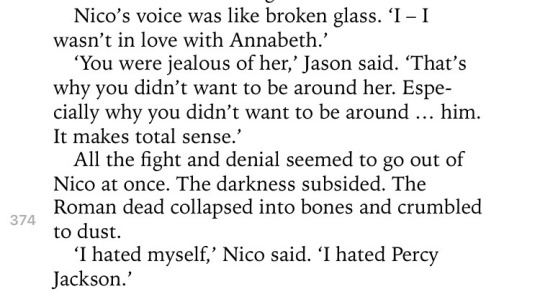
Jason loves Nico where he is, without conditions, without forcing Nico to become something more. Jason didn’t force Nico to say more than what was necessary for him to understand, Jason looked at Nico and he called Nico brave.
Cupid is a more volatile form of love than Aphrodite, Cupid shoots arrows that makes people animals, that can make a god grow insane, but Aphrodite's form of love is about acceptance and humanity (think to how she picked Ares over Hephaestus even if it was perhaps "wrong")- both are about truth but one is about force and the other about acceptance.
When Nico walks out of there, he makes his choice- he is forced to come out yes, Cupid is wrong for doing this, but Jason again stays a figure of love in Nico's life. Jason basically says, "Good job, I know that was hard, thank you for sharing and let me know if you need anything, people will care about you and understand you," again and again and again to Nico, he doesn't tell Nico he has to come out, and he agrees to keep it between them for now. Jason is love as acceptance, Jason is the first person who unconditionally loves Nico, and that's the choice.
Will Nico accept unconditional love? If the answer is no, then Cupid wins and Nico is denying himself. If the answer is yes, then Jason and Nico win, and Nico no longer needs to make himself utilitarian in love in order to be loved.
The choice is made with Reyna and Hedge, most specifically Reyna.
When he accidentally comes out to them, and they accept him without making a big deal of it, without show, just that acknowledgement and "thank you for sharing" and Nico accepts their words and friendship still- Nico made his choice then to accept the love he was being freely given.
“He carried so much sadness and loneliness, so much heartache. Yet he put his mission first. He persevered. Reyna respected that. She understood that. She'd never been a touchy-feely person, but she had the strangest desire to drape her cloak over Nico's shoulders and tuck him in. She mentally chided herself. He was a comrade, not her little brother. He wouldn't appreciate the gesture.”
This is where we see the slow and steady, and healthy, end to Nico's arc in regards to love really grow into itself, and he begins to heal. He no longer sees such an intense need to make himself utilitarian for love, and he begins to heal from his internalized homophobia too.
(Internalized homophobia discussions with Nico also bother me too often times, people too often assume you can't date while struggling with internalized homophobia or at least very heavy handedly imply that which is just not true... You may have some issues in your relationship, but you can work through the internalized homophobia while building a new relationship and be just fine. Also to assume someone has an unhealthy relationship because of internalized homophobia is weird and lowkey reinforces the idea that "broken" people don't need love, but also does a huge disservice to so many LGBTQ+ people who are happily married/themselves but still struggle with these feelings, and to see a healthy relationship depiction despite someone in that relationship struggling with internalized homophobia is fine and good actually. As long as the individual can recognize what they're dealing with, and work through it in a healthy and constructive manner, then there's nothing wrong there...)
When I started this post to be honest I thought I would have a lot more to say, it's a scene that touched and changed me so deeply as a person, and beyond that in a more objective experience it completely changes Nico's character, by turning his arc around and beginning his healing process. To be honest, there probably is more to be said on it, I just haven't found the words yet... I know parts of this post are clunky and in a year I'm going to read this and see all the places it could be better but for now I'm content with it.
Whether or not someone considers the scene homophobic is a subjective experience, but I think this is a very well written scene purely for the characterization and symbolism, intentional or otherwise. I don't really care that much to debate if it's truly a homophobic scene or not, I can see both why people say it is and why people say it isn't and that can be culminated into "people have different needs" and "minorities aren't a monolith". Personally my much larger complaint is the complete lack of nuance and insight scenes like this are handled with, not the matter of personal opinion an individual reaches on the scene.
*the post uses the word "adult audience" and yes, fair point, children should not be able to decipher symbolism to the extent adults can. But older children and young teens, which the RRverse series are sold for, is when critical thinking skills and media analysis do begin to become parts of classroom curriculum. The scene does an excellent job of not outright stating Cupid is evil, but of depicting that in a very clear cut way.
#nevermind i lied here you go#nico di angelo#meta#long post#anon#ask#internalized homophobia#fandom homophobia
205 notes
·
View notes
Note
I'm a Chinese, nationally and racially. Racial projection seems to be a common practice in western fandom, doesn't it? I find it a bit... weird to witness the drama ignited upon shipping individuals with different races, or the tendency to separate characters into different "colors" even though the world setting doesn't divide races like that. Such practice isn't a thing here. Mind explaining a bit on this phenomenon?
--
Sure, I can try. But of course, fish aren’t very good at explaining the water they swim in.
Americans aren’t good at detecting our own Americanness, and a lot of what you’re seeing is very much culturally American rather than Western in general. (In much of Europe, “race” is a concept used by racists, or so I’m told, unlike in the US where it’s seen more neutrally.) Majority group members (i.e. me, a white girl) aren’t usually the savviest about minority issues, but I’ll give it a shot.
The big picture is that most US race stuff boils down to our attempts to justify and maintain slavery and that dynamic being applied, awkwardly, to everyone else too, even years after we abolished slavery.
There’s a concept called the “one drop rule” where a person is “black” if they have even one drop of black blood.
We used to outlaw “interracial” marriage until quite recently. (That meant marriage between black people and white people with Asians and Hispanic people and others wedged in awkwardly.) Here’s the Wikipedia article on this, which contains the following map showing when we legalized interracial marriage. The red states are 1967.
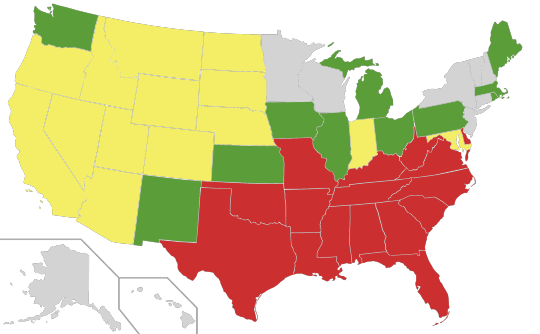
That’s within living memory for a ton of people! Yellow is 1948 to 1967. This is just not very long ago at all. (Hell, we only fully banned slavery in 1865, which is also just not that long ago when it comes to human culture.)
Why did we have this bananas-crazy set of laws and this idiotic notion that one remote ancestor defines who you are? It boils down to slavery requiring a constant reaffirming that black people are all the same (and subhuman) while white people are all this completely separate category. The minute you start intermarrying, all of that breaks down. This was particularly important in our history because our system of slavery involved the kids of slaves being slaves and nobody really buying their way out. Globally, historically, there are other systems of slavery where there was more mobility or where enslaved people were debtors with a similar background to owners, and thus the people in power were less threatened by ambiguity in identity.
Post-slavery, this shit hung around because it was in the interests of the people in power to maintain a similar status quo where black people are fundamentally Other.
A lot of our obsession with who counts as what is simply a legacy of our racist past that produced our racist present.
--
The other big factor in American concepts of identity is that we see ourselves as a nation of immigrants (ignoring our indigenous peoples, as usual). A lot of people’s families arrived here relatively recently, and we often don’t have good records of exactly where they were from, even aside from enslaved people who obviously wouldn’t have those records. Plenty of people still identify with a general nationality (”Italian-American” and such), but the nuance the family might once have had (specific region of Italy, specific hometown) is often lost. Yeah, I know every place has immigrants, and lots of people don’t have good records, but the US is one of those countries where families have on average moved around a lot more and a lot more recently than some, and it affects our concepts of identity. I think some of the willingness to buy into the idea of “races” rather than “ethnicities” has to do with this flattening of identity.
New immigrant groups were often seen as Other and lesser, but over time, the ones who could manage it got added to our concept of “whiteness”, which gave them access to those same social and economic privileges.
Skin color is a big part of this. In a system that is founded on there being two categories, white owners and black slaves, skin color is obviously going to be about that rather than being more of a class marker like it is in a lot of the world.
But it’s not all about skin color since we have plenty of Europeans with somewhat darker skin who are seen as generically white here, while very pale Asians are not. I’m not super familiar with all of the history of anti-Asian racism in the US, but I think this persistent Otherness probably boils down to Western powers trying to justify colonial activities in Asia plus a bunch of religious bullshit about predominantly Christian nations vs. ones that are predominantly Buddhist or some other religion.
In fact, a lot of racist archetypes in English can be traced back to England’s earliest colonial efforts in Ireland. Justifying colonizing Those People because they’re subhuman and/or ignorant and in need of paternalistic rulers or religious conversion is at the bottom of a lot of racist notions. Ironic that we now see Irish people as clearly “white”.
--
There are a lot of racist porn tropes and racist cultural baggage here around the idea of black people being animalistic. Racist white people think black men want to rape/steal white women from white men. Black women get seen as hypersexual and aggressive. If this sounds like white people projecting in order to justify murder and rape... well, it is.
Similar tropes get applied to a lot of groups, often including Hispanic and Middle Eastern people, though East Asians come in more for creepy fantasies about endlessly submissive and promiscuous women. This nonsense already existed, but it was certainly not helped by WWII servicemen from here and their experiences in Asia. Again, it’s a projection to justify shitty behavior as what the party with less power was “asking for”.
In porn and even romance novels, this tends to turn up as a white character the audience is supposed to identify with paired with an exotic, mysterious Other or an animalistic sexy rapist Other.
A lot of fandoms are based on US media, so all of our racist bullshit does apply to the casting and writing of those, whether or not the fic is by Americans or replicating our racist porn tropes.
(Obviously, things get pretty hilarious and infuriating once Americans get into c-dramas and try to apply the exact same ideas unchanged to mainstream media about the majority group made by a huge and powerful country.)
--
Politically, within the US, white people have had most of the power most of the time. We also make up a big chunk of the population. (This is starting to change in some areas, which has assholes scared shitless.) This means that other groups tend to band together to accomplish shared political goals. They’re minorities here, so they get lumped together.
A lot of Americans become used to seeing the world in terms of “white people” who are powerful oppressors and “people of color” who are oppressed minorities. They’re trying to be progressive and help people with less power, and that’s good, but it obviously becomes awkward when it’s over-applied to looking at, say, China.
--
Now... fandom...
I find that fandom, in general, has a bad habit of holding things to double standards: queer things must be Good Representation™ even when they’re not being produced for that purpose. Same for ethnic minorities or any other minority. US-influenced parts of fandom (which includes a lot of English-speaking fandom) tend to not be very good at accepting that things are just fantasy. This has gotten worse in recent years.
As fandom has gotten more mainstream here, general media criticism about better representation (both in terms of number of characters and in terms of how they’re portrayed) has turned into fanfic criticism (not enough fics about ship X, too many about ship Y, problematic tropes that should not be applied to ship X, etc.). I find this extremely misguided considering the smaller reach of fandom but, more importantly, the lack of barriers to entry. If you think my AO3 fic sucks, you can make an account and post other fic that will be just as findable. You don’t need money or industry connections or to pass any particular hurdle to get your work out there too.
People also (understandably) tend to be hypersensitive to anything that looks like a racist porn trope. My feeling is that many of these are general porn tropes and people are reaching. There are specific tropes where black guys are given a huge dick as part of showing that they’re animalistic and hypersexual, but big dicks are really common in porn in general. The latter doesn’t automatically mean you’re doing the former unless there are other elements present. A/B/O or dubcon doesn’t mean it’s this racist trope either, not unless certain cliched elements are present. OTOH, it’s not hard for a/b/o tropes to feel close to “animalistic guy is rapey”, so I can see why it often bothers people.
A huge, huge, huge proportion of wank is “all rape fantasies are bad” crap too, which muddies the waters. I think a lot of people use “it’s racist” as an easy way to force others to agree with their incorrect claims that dubcon, noncon, a/b/o, etc. are fundamentally bad. Many fans, especially white fans, feel like they don’t know enough to refute claims of racism, so they cave to such arguments even when they’re transparently disingenuous.
--
Not everyone here thinks this way. I know plenty of people offline, particularly a lot of nonwhite people, who think fandom discourse is idiotic and that the people “protecting” people or characters of color are far more racist than the people writing “bad” fic or shipping the wrong thing.
But in general, I’d say that the stuff above is why a lot of us see the world as white people in power vs. everyone else as oppressed victims, interracial relationships as fraught, and porn about them as suspect. Basically, it’s people trying to be more progressive and aware but sometimes causing more harm than good when those attempts go awry.
167 notes
·
View notes
Text
You Look So Lovely, Darling (I’ll Love You for Lifetimes) - |BaL|
Kinda feels weird to be writing the proposal scene so early, but like? This drabble series is all out of order so whatever lmao :) enjoy some sweet nervous channie who just wants his proposal to be perfect <3
(and again, thanks to @deathbykpopboys for helping me work out this scene!! I LITERALLY owe you the world if you ever have ANY requests I'll be willing to write them :D)
Pairing: Chan x fem!reader
Genre: fluff, slice of life, single parent!au
Triggers: cursing
Word Count: 2.9k
Chan just wants to give you a picture perfect proposal - why is that so hard?
SKZ Masterlist | Breathe, and Live | Touching Stars (TBZ teacher!au)
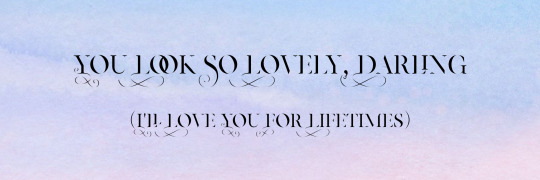
Proposing, Chan comes to learn, is no easy task.
It looks so simple in movies. One of the couple pulls a ring out of their pocket, kneels down in front of their significant other, and pops the question. There might be tears, but it always ends in pure joy.
Movies make it seem like a formula, a simple algorithm that Chan just has to follow in order to get this proposal right. In real life, though, Chan thinks he’s about to lose his mind.
Because movies don’t demonstrate how to act in front of an older brother very protective of his sister. They don’t show him how to talk to his children or hers, how best to ask them if they’re all right with gaining new siblings and a new parent. They don’t give him insight on how to pick the perfect god damn ring, something maybe reminiscent of the promise rings you both wear on chains around your necks, but also not too similar because what if you think he isn’t being creative?
And the worst thing is, they don’t tell him how to pick the perfect moment. They don’t tell him where to go, what ambience is right, whether or not little kids in the room will ruin the timing.
At this point, just thinking about proposing turns Chan into a stammering mess. Even though you’ve discussed marriage before, you haven’t made any large moves beyond that. Jisung and Felix have been calling you Mama for a bit, but Hyunjin has only just started calling him Papa, and mostly on accident (though each time he does, Chan’s heart fills with this overwhelming happiness that brings tears to his eyes). What if you decide now isn’t the right time? What if you decide you want to wait a little longer?
What if you decide Chan isn’t the right person for you?
That’s a question that plagues Chan every time his mind even brushes on the topic of marriage.
He loves you, though, he loves you so much. And he knows you’re the right partner for him, even if in the end you might decide he isn’t the right partner for you.
Patience, he tells himself, taking a deep breath. He really should be working on this new track, but instead, he’s staring into his hands, trying to map out the perfect proposal. Not too fast, Chan. Take it in steps.
The only problem is, step one scares him out of his wits.
. . . . .
Chan is a full year older than Minho, and then some. By all rights, he’s the elder, and he shouldn’t be as terrified of the younger man as he is.
Minho’s a scary person, though. He’s driven, concentrated, focused – it’s how he’s gotten so far as both a dancer and a father. Chan knows he’s hardworking, but Minho is just as much, if not more, than he is.
And he’s very protective of you.
(When Minho found out you two were dating, he told Chan, verbatim, “I won’t hesitate to take you to international waters, chop up your body, and toss the parts overboard if you hurt my sister.” Just thinking about the blank expression Minho had on when he spoke those words is almost enough to make Chan lose his nerve.)
But here he is, standing just outside of Minho’s studio, ready to knock. He’s sweating, not because it’s hot or anything (it’s actually pretty cold because Minho is weird like that), but just out of sheer nervousness. His heart feels like it’s pounding a mile a minute.
Oh, God. Chan raises his hand again to rap on the door. Stop thinking. Just do it.
He knocks.
A few seconds later, the dancer opens the door in all his sweaty glory. “Chan?”
“Yeah.” Chan tries to smile, but he’s pretty sure it just looks like a grimace. “Can I ask you something?”
A glint comes into Minho’s eyes. “Of course, come on in.” He opens the door widely, smiling in a distinctly cat-like fashion that is literally scrambling Chan’s brain.
Why does he look like he knows what Chan’s about to ask?
The door swings shut with a soft but audible click, and with the noise goes Chan’s last chance to run away.
“So?” Minho looks over once Chan’s inside the room. He’s enjoying this way too much.
There’s no way he doesn’t know what I want to ask.
“I… um, so I’ve been dating your sister for a few years,” Chan starts.
Minho actually snorts. “Yes, I’m aware.”
Chan can feel the tips of his ears turning bright red. “Right. Um, I just wanted your approval for – I’m planning to – well, with your permission, of course –”
The smirk on Minho’s face only grows with each stuttering word that comes out of Chan’s mouth. And in all honesty, he actually has no idea what he’s saying. All of the sentences he rehearsed in his head before coming here seem to have completely flown out of his brain, and from Minho’s expression, he just sounds like an idiot.
He keeps going anyway, because nervous Chan doesn’t always make the best decisions to make himself look good.
“Well – um, look, I just really love her a lot.” Chan looks down with the admission, knowing he’s definitely rambled too much already, but he needs to get on with it and ask the stupid question. “I… wantedtoaskifyouwouldbeokaywithmeaskingtomarryher.”
Minho leans forward, eyes innocently wide. “Sorry, I didn’t get that, can you repeat what you said again?”
Lee Minho, you are a grade-A asshole.
Face burning, Chan clears his throat. “I wanted to ask if you would be okay with me asking to marry her. Your sister, I mean.”
Silence. Minho leaves him in silence for five whole seconds which feel more like five millennia. Chan thinks he’s going to crumble into dust on the floor out of terror and embarrassment.
“Do you have a ring?” Minho finally asks.
Chan’s cheeks burn redder. “Not… not yet.”
“So you’ll need help picking one, then?” The dancer raises one perfect eyebrow.
“… Yes?”
“Beautiful. I’ll be there whenever you need me.” Minho smiles. “Anything else you wanted to ask?”
Chan just stands there, dumbfounded. “So… is your answer yes?”
The smile immediately drops off of Minho’s face, replaced by an eye roll and a sigh. “Yes, Bang Chan, you idiot.” He punches Chan’s shoulder. “No one’s ever going to fully deserve Y/N, but you’re the closest I think anyone’s going to get. You really thought I’d say no?”
Rubbing his arm, Chan smiles sheepishly. “You can’t blame me for being nervous.”
“What? Nervous, around me?” Minho laughs, sharp and loud. Even though Chan knows he’s teasing, it’s still a bit frightening. “Never would’ve thought that.”
“You’re just proving my point,” Chan says.
“No, I’m not.” Minho smiles, close-lipped and slit-eyed. It’s terrifying. “Now, off you go. And don’t come back unless you need help picking a ring!”
It takes Chan five minutes of sitting in the hallway, garnering strange looks from several people passing by, before his legs are stable enough to take him back to his own studio. Heart still pounding, he mentally crosses a line through step one.
Next comes step two. Chan purses his lips. Step two is a bit less scary than step one (mostly because it involves children and not Lee Minho), but no less challenging.
Well, he got through Minho. Chan sighs. He just has to hope that the kids will be as receptive to the idea of a new parent as Minho was to a brother-in-law.
. . . . .
The kids know that you and Chan are at least, in some shape or form, together. They might not understand the nuances, like how you’re technically dating but don’t always refer to yourselves as boyfriend and girlfriend (because it just feels so much deeper than that, somehow), but they understand that you two “like” each other (Jisung pretends to vomit every time he hears the word “love,” so Chan just uses the word “like” to avoid that) and thus live together.
They love it, most of the time. Hyunjin was a little put out when he found out he would have to share a room with two other boys, but after Minho moved out and Hyunjin realized he would get his uncle’s old (and slightly bigger) room, he happily accepted the new plan. Jisung and Felix were mostly just happy to live with their best friend.
(Children, Chan just thinks. They’re so easy and so hard to please.)
Of course, there are difficulties. Jisung’s sensitive and has more than once broken down when he thinks Chan isn’t giving him enough attention with a new boy in the household. Felix’s tantrums are rarer, but they exist, and Hyunjin is still getting used to sharing his mom with someone else.
They’re a family, though, a messy, mostly happy family that can pull together at the end of the day and whisper “I love yous” to each other before bedtime. And that’s something Chan values more than anything in the world.
Which is why obtaining his kids’ approval for officially tying the knot is something so important to him.
He gathers them together one day in the apartment with the promise of watching a cartoon show after he asks them something. Three pairs of big eyes stare up at him from the couch, and Chan feels his heart melting with love and racing with anxiety.
Chan takes a breath. “Do you know what marriage is?”
“Yeah!” Jisung pipes up. “It’s when a girl and a boy get together and kiss!”
The laughter spills out of Chan’s mouth before he can even think. “Well, not quite, Jisung,” he chokes out, trying to stifle his remaining giggles. “It’s when two people who love each other very much get together officially. Marriage can be between a woman and a man, a man and a man, or a woman and a woman. Any two people can get married.”
Three small heads bob their heads in understanding.
“I wanted to ask you three if you would be okay with me marrying Y/N.” Chan looks each of the boys in the eye. “Is it?”
Felix nods quickly. “Yes!”
Jisung furrows his eyebrows. “Are we still going to live together?”
Chan smiles. “Yes, Sungie.”
The other twin nods. “Okay!”
Hyunjin’s mouth pouts slightly. “Will I have to call you Papa?”
A little piece of Chan’s heart breaks, but he tries not to show it. “No, of course not, Hyunjin.” He smiles as brightly as he can. “You can keep calling me Channie or Uncle Channie or whatever you want. You don’t have to call me Papa if you don’t want to.”
Hyunjin’s round, dark eyes gaze into his with a solemnity Chan honestly didn’t know toddlers could have. “Do you want me to call you Papa?”
Oh, fuck.
What the hell does Chan say to that?
With a sigh, he decides to be honest. “I would love it if you did, Hyunjin, but like I said, you don’t have to. I’ll never force you to do something you really don’t want to.”
There are a few seconds of silence, then Hyunjin nods. “Okay. You can marry my Mama.”
A weight lifts itself off of Chan’s chest and he smiles, freer this time. “Thank you, kids. One more thing – don’t tell Y/N about this!” He looks into each of their eyes, trying to convey how serious he is but in a fun way. “It’s a secret, okay?”
“Like a spy mission?” Jisung bounces in excitement.
The smile on his face widens. “Yes, Sungie. Like a spy mission.” He looks at the other two boys. “Do you promise? Pinky promise?” He holds out his pinkie.
The three resulting shouts of “YES!” make Chan hope their neighbors won’t come knocking. But even if they did, Chan thinks, he wouldn’t care.
He’d go to the ends of the earth to defend these three kids, after all.
. . . . .
Step three goes by in a flash. Out of sheer anxiety, Chan actually takes a full day off from work and calls Minho for help in finding the perfect ring.
Miraculously, he finds something within his budget range – a silver band with a small diamond set in the center. It’s simple but elegant, and the diamond glints beautifully in the sunlight. Really, the ring matches the way Chan often finds himself summing up your existence.
So only the last step remains: the actual proposal.
Looking back, Chan has no idea why he thought each of the other steps was so stressful. This is pure stress, he thinks, waiting for the perfect time to pop the question. Should he plan something extravagant? Or should he just go with the flow? When is the perfect time, anyway? What constitutes “perfect” in your mind? In his?
Minho just tells him to wait for the moment he thinks is “right.” But what the hell does “right” even mean?
“You’ll figure it out.” The dancer gives Chan a bright grin, patting his shoulder. “And if you don’t, I’ll tear you limb from limb.”
Chan just puts his face in his hands and screams.
. . . . .
When Chan proposes, the sky is dark. The kids are already tucked in bed, and you’re sitting on the couch, leaning into his shoulder as you mindlessly scroll through your phone.
Absently strumming his guitar, Chan smiles down at your face, illuminated by your phone’s glow. As if sensing him staring, you look up as well. “Sing me something?” you murmur.
“Of course, love.” He leans down to kiss the top of your head. “What song?”
“Anything you choose,” you reply. “Anything.”
Chan thinks for a moment, then starts strumming the instrument.
Softly, with mood, tightly hug her
Use it once a day, every day…
When your eyes meet hers, smile.
The characteristic chords of one of your favorite songs make you relax even further into Chan’s body, a smile blooming across your face. He badly wants to stop playing and just kiss you good and full, but he keeps his fingers strumming the guitar.
Let her breathe under a different sky, a different wind,
Sometimes, kiss her without a plan…
Chan almost stops playing.
Without a plan.
He doesn’t have a plan. He doesn’t have any proper plan on how he’s going to pull the little box out of his pocket and ask the question. But now…
Maybe he’s got an idea.
The final chords die away, and Chan finally gets his long-awaited kiss when you sit up lethargically, pressing your lips to his softly. “Are you awake enough for one more?” he whispers when you pull away.
“Mm, one more.” You nod happily, snuggling back into his side. “Then sleep.”
Chan takes a breath. One chance, Chan. This is your chance.
His fingers start strumming a song very familiar by now to him and the boys. From the way your eyes light up, you recognize it too.
It doesn’t have words. It’s just a collection of guitar chords, hastily arranged in a sweet, rough melody. In the track version, it would have piano, but because Chan only has two hands, he has to make do with just the strings of the guitar.
It’s the first song he ever wrote for his twins, the song he created that day so many years ago when they weren’t even born, when they were still kicking in their mother’s stomach. They think of it as their family song, the song he plays when the twins are sad, when they can’t get to sleep, or when they just want to hear something nice.
The last strains of the song fade away and Chan looks at you to see a tear glittering on your cheek. “You play that when the boys are sad,” is all you say. “It’s your family song.”
Chan smiles softly. “But you’re part of the family too.”
When he pulls out the box, your eyes widen. “Chan –”
“Shh.” He presses a finger gently to your lips. “Y/N, the past few years you’ve been with me have been some of the best of my life, and I can’t ever thank you enough for staying with me all this time.” There’s a tear welling up in Chan’s eye, but he blinks it away. “I would love to spend the rest of my life with you, if you would marry me.”
There’s a moment of silence that nearly gives Chan a heart attack. What if you say no?
“You – you stupid romantic sap.” The tears are really sliding down your cheeks now, but your mouth is smiling wide. “Yes, of course I’ll marry you, Chan. I’ll marry you.”
Chan can’t speak as he slides the ring onto your finger with trembling hands. Throat choked, he can only pull you close, burying his face in your shoulder as your tears soak his shirt. “I love you so much,” you whisper.
He pulls back just enough for to see your eyes sparkling with love, so much love. Your touch intoxicates him, with your fingers pressing gently against his skin as you press your lips to his in a sweet, sweet kiss.
Yes, he thinks. You’re the right partner for him.
The perfect partner for him.
Teary-eyed, he smiles. “I love you too.”

If you enjoyed, please don’t forget to reblog and leave a comment to tell me what you thought! Thank you for reading and have a lovely day <3
(1 reblog = 1 congratulations for the newly engaged couple!!!)
#inkidz#destinyverse#kpopscape#stray kids#skz#stray kids chan#chan#skz chan#stray kids scenarios#stray kids imagines#stray kids oneshots#skz scenarios#stray kids chan scenarios#stray kids x reader#skz x reader#stray kids chan x reader#skz chan x reader#bang chan x reader#chan x reader#fluff#triggers#cursing#single parent!au#breathe and live#you look so lovely darling (I'll love you for lifetimes)#scriptura-delirus
243 notes
·
View notes
Text
ACOTAR and Setups Part II: Tamlin and Rhysand
SPOILERS: ACOTAR series (and Macbeth too ig)
Part 1: Feyre
In "Macbeth", Macbeth and Banquo are narrative foils to each other. While Banquo is loyal to the king and uses language of growth and imagery of nature when he speaks, the traitor Macbeth's words are full of references to destruction, fire, and unholy happenings. Foils are not just good ways to explore character traits, but also excellent for setting up conflicts and exploring the thematic concerns of the world.
I think it's safe to say Tamlin and Rhysand are foils. They have opposing imagery (spring, flowers and sun for Tamlin, winter, snow and night for Rhysand) and always stand in opposition to each other when it comes to Feyre's narrative, switching in and out of being the "bad guy" and the "good guy". But the way this is handled is .... eh.
I'm going to look at shifts in Feyre, Tamlin and Rhys that work of this foil - and try to look for when and how they were set up.
1. Feyre's shift - TW: discussions of abuse, mental health issues
In the first book, Tamlin is a source of protection and love for Feyre. But by the second book, Feyre is not only struggling with her PTSD but has begun to realise that life at the Spring Court as a dolled up accessory might not be for her. By the end of the book, she has found her place in the Night Court - by Rhysand's side. And honestly? Go girl! Go live up to your potential!
The problem arises with how this is done - that is, Sarah J Mass never does the brunt work of showing us why Feyre cares. It is plausible she is motivated by a desire to protect the human lands, but we never actually see that. There isn't a moment where she realises she needs to work for a greater good, or a moment she realises that she needs to protect those more vulnerable than her - instead, the narrative has her tolerating abuse until she finally has had enough.
Which is great. I have got to admit that I really like the explicit rejection of a happily ever after storyline for Feyre because it took away her agency. But we get this radical shift in character motivation from wanting to be protected and comfortable with those she loves to desiring agency and understanding of herself in two lines:
"The girl who had needed to be protected and who had craved stability and comfort... she had died Under the Mountain"
and
"I didn't know how to go back to those things. To being docile"
hhhhhh. I mean - if you have to say it that explicitly, you're already doing something wrong. But also, why? We never see Feyre struggling with herself in her new body, and wondering why she does not want the same things as she did when she was a human, never see an impetus point for when her desires shifted.
But honestly? I don't mind Feyre's arc. I think it's a bit confused and lacks clarity or intent, and as a result, it is harder to root for her because you don't quite know what she wants, but I think it's still quite good. Where I really have problems are with Tamlin ad Rhys.
2. Tamlin - TW: discussions of abuse, mental health issues
I am not a fan of Tamlin's arc. You could argue that it is part of the thematic message of the series: that things are not as they seem. Tamlin is the wolf to the savour to the abuser, Rhysand is the "most beautiful man " Feyre had ever seen to Amarantha's monster to Feyre's eventual mate. But - the constant twists are unnecessary, more importantly, they and have little to no foreshadowing and just seem like retcons- making it seem as if they are there to keep the audience guessing rather than genuine plot progressions. This becomes even more obvious when the series abandons its core theme of "appearance vs reality" altogether, and as a result loses a lot of its cohesion: a direct consequence of having a bad setup.
His reason for doing the abusive things he does is conveyed to us in two lines, in the same monologue that Feyre's motivation is:
"Tamlin had gotten his powers back, had become whole again - become that protector and provider he wished to be"
Sure. He was much more powerful than Feyre when they first met, so I am having a hard time buying it is the return of the powers that his making him act this way. We know that his actions come from a genuine desire to protect Feyre - this is the guy that was willing to sacrifice his life multiple times and the future of his entire court to keep her safe. The only justification we have left then for the way he acts is that his PTSD, borne out of the trauma and torture he underwent and watched Feyre undergo changed him in some way.
This is why the endless villainizing of Tamlin makes me really uncomfortable. While it is true that the abused can become the abuser, and figuring out how to help them while protecting yourself is something that absolutely needs to be discussed and explored - the way it is done with Tamlin is horrendous because he is never given a chance to heal. Instead, he is thrown from plot point to plot point, an eternal punching bag for the Inner Circle and others to seem morally superior in front of.
And his treatment of Feyre is just weird. If he's so concerned about her safety - why does he not wake up when she has nightmares? Is he instead trying to pretend like everything is okay - if so why does he give Feyre an escort of guards? If his core motivation is protecting Feyre at all costs - why does he lash out at her?? And the text really tries to tell us how to feel about him in this regard, but it doesn't do it very well. For example, take the scene where Tamlin says "There is no such thing as a High Lady". Feyre a second before expressed her desire not to take on any responsibility, and Tamlin responded with this - and the text really makes us want to hate him for it, but all you can see is a person who is perhaps not the best at reading subtext trying his best.
In conclusion - Tamlin's shift to the villain of the narrative is hamhanded and underexplained, making it hard to genuinely hate him, and further confusing the narrative.
3. Rhys the foil gets the girl - TW: discussions of abuse, sexual assault mental health issues
Rhysand in the first book is interesting - he clearly has a heart and a soft spot for Feyre but is also a schemer with dubious motives that drugs and sexually harasses Feyre. There are places in the set up where we understand he cares - but never where we can begin to see he might be a genuine paragon of virtue.
And I will address this more in my post on ACOMAF, but the point I am trying to make here is: we are told through the constantly opposing imagery that Rhys and Tamlin are wolds apart - but never actually given examples of how. Rhys is said to be different from Tamlin because he respects Feyre's choice - but he drugs her in a bunch of weird scenes (that serve no clear narrative purpose by the way - like what was he trying to achieve? why he couldn't he just let Feyre in on that part of the plan?) and withholds information from her about life-threatening situations. Rhys is said to pull less rank - but we multiple times see others defer to him, especially in later books, and never actually see rank being enforced in Tamlin's court with his treatment of Lucien (many times described as his partner, and openly questioning him) and later Ianthe. Rhys is said to have less archaic laws in opposition to Tamlin's Tithe - but he abandons the Court of Nightmares to the monsters who rule it, and never takes serious actions against the Illyrian people who clip of women's wings, and a lot of Tamlin's idea of racial superiority and general superiority just come completely out of left field in the middle of ACOMAF.
Both of them are problematic - it's just that the text tells us to root for one, without actually showing us how one is better, or setting up any clear ideological difference between them. And that cheapens Feyre's character shift and lessen the efficacy of the foil - turning it into Feyre hopping from one lover to the other with little to no character consistency and no nuanced exploration of the theme of the series or trauma.
#tamlin#rhysand#feyre#anti rhysand#anti feyre#tamlin deserved better#critique#anti sjm#anti acotar#anti acomaf#god adding tags exhausting#anti sarah j mass
73 notes
·
View notes
Note
I'd love to hear more of your thoughts about why P5R didn't quite land for you. I had the same reaction to it, but I've never quite been able to properly articulate why the last section fell so flat.
God okay so I've tried several times to answer this, and it seems like the answer is 'I still have way too many feelings, personally, to say this in anything less than thirty pages and fifteen hours of work', because Persona 5 the original is a game I loved a lot and care about a great deal. And most of the reasons I disliked Royal feel, in my head, like a list of ways it broke some of the things I liked best about P5--which means explaining them feels like I need to explain everything I loved about the original game, which is a book in itself, complete with referents to P3, P4, Jungian psychology, the Joseph Campbell mytharc, and fuck all even knows what. And that is too much.
But today I realized that I could instead describe it from an angle of, Persona 5 Strikers succeeds really well at doing the thing I think Royal was trying to do but failed at. And that I think I can talk about in a reasonable amount of wordspace, hopefully, behind this cut because I have at least one friend who hasn't played Royal yet.
Note for reblogs/comments: I HAVE NOT FINISHED STRIKERS YET. I got through the jail that pretended to be the final jail and have not yet gone into the obviously inevitable 'ohshit wait, you mean there's something more than simple human machinations behind all of this?' dungeon. (I got stuck on a really frustrating side quest, put the game down, and then dived into Hades to avoid throwing the Switch across the room for a while--and anyone around this blog lately knows how THAT'S been going.) Please no spoilers past Okinawa!
So, one of the many, many things I really appreciated about Persona 5 was its straightforward and unashamed attitude towards abusers and their acts of violence. Because, while yes P5 is a story about the use of power and control to make others suffer, it fundamentally isn't about those abusers themselves. It's about their victims, those that survive their crimes. And this shows up repeatedly over the course of the game.
We do not give a shit why Kamoshida wanted to beat and rape his students. We really don't. Kamoshida does not deserve our attention one moment longer than it takes to make him stop. Because, ultimately, that's the goal of P5, start to end. We don't know for sure if what we're doing is fair, if it's justice, if it's questionable. What we know is that people are being hurt, badly, actively, right now this second. What we know is that victims are suffering. What we know is that we, personally, us-the-protag and us the Phantom Thieves at large, are in danger. And in those circumstances, we don't care about the abuser's side any more. We don't. We don't have the space or time or capacity to care, because that is not the point.
The point is to help the weak. To save the people who need saving, right here and now. To give others the courage to stand up on their own behalf. We're not even out to change society, not really--that's a byproduct. We are reactions. We are triage. We are important.
There's something so empowering and validating about that as a theme, y'know? In a media landscape so full of "sympathetic villains", the idea that, you know, maybe sometimes you don't have to break yourself to show compassion that might possibly heal the bad guy--that sometimes you can just make the bad guy stop hurting people--feels both refreshing and satisfying. I really appreciate it as a message! I liked it a lot!
And yes, there's nuance to that theme, and the game is not without compassion. We save Futaba, because 'make the bad guy stop hurting people', in that case, means 'make this person stop hurting herself'. We give Sae a path forwards, help her fix her own heart. Yet it's worth pointing out that in both of those cases, while we were very glad to do those things, to save those people, we also went into both of those palaces for extremely practical reasons to begin with. We needed Futaba's help. We needed Sae's help. The fact that we chose to talk Sae into a change of heart rather than simply stealing her treasure, while ultimately a very good thing for her, was absolutely a practical choice predicated on the need for her palace to still exist to save our life. And yes, we wanted to save her, for Makoto's sake--yes, we wanted desperately to save Futaba. But Sae and Futaba let themselves be helped, too, and that doesn't change the overarching themes of the story itself.
Akechi (and to some extent Okumura) would not let himself be helped. Akechi's another interesting nuance to this theme, because of all our villains, we do learn the most about what drove him to the cruelties and crimes he's committed. He's at that intersection of victim and villain, and we want to help him, as a victim--but we also know that stopping him as a villain is more important. We'd like to save him from himself if we could, because we save people from their sources of trauma, it's what we do. We regret being unable to do so. But in the end, what matters to the story is not that Akechi refused to be saved--it's that Shido and Yaldabaoth need to be stopped, for the sakes of everyone else they're hurting now and may continue to hurt in the future.
The thing is, there's space and maybe even a need for a corollary discussion of those places where victim and villain intersect. It's an interesting, pertinent, and related topic. Strikers made an entire video game about it, a really good video game. It's centered in the idea that, yes, these people need to be stopped, and we will make stopping them our priority--but they're not going after us, and that gives us some space to sympathize. Even for Konoe, who specifically targets the Phantom Thieves--compare him to Shido, who actively destroyed the lives of both Joker and Futaba, who ordered Haru's father's death, who's the entire reason the team is still dealing with the trauma of Akechi's everything. Of course the game can be sympathetic to Konoe where it can't with Shido. There's enough distance to do that.
But right--Strikers is a separate game. It's a separate conversation. It's, "last time, we talked about that, so now let's take it one step further." And that's good writing. (It's something Persona has done before, too, also really well! Persona 3 is about terrible, occasionally-suicidal depression and grief. P4 is about how you can still be hurting and need some help and therapy even if things seem ok. Related ideas, but separate conversations that need to be separate in order to be respectful and do justice to either one. P5, as a follow-up to P4, is a conversation about how, ok, changing yourself is great and all, but sometimes the problem is other people so how do you deal with that? Again, still related! Still pertinent! Still alluded to in P4, with Adachi's whole thing--but it wasn't the time or place to base a quarter of the game around it.)
So one of Royal's biggest issues, to me, is that it tries to tack on this whole new angle for discussion onto a game that was originally about something else.
Adding Maruki's palace--adding it at the end, which by narrative laws suggests that it's the true point that everything else should be building up to--suddenly adds in about a hundred new dimensions at once. It wants us to engage with "what in this abuser/manipulator's life led him to act this way?" for basically the first time all game (we'll get to Akechi later). It wants us to engage with, "if the manipulator has a really good reason or good intentions, does that mean we should forgive them?" It requires us to reflect on, "what is the difference between control and cruelty?" It asks, "okay, but if people could be controlled into being happy, would that be okay?" (Which, based on the game so far, is actually a wild out-there hypothetical! Literally not a single thing we've seen in the game suggests that could ever happen. Even the people who think being controlled is safer and easier are miserable under it. Control that's able to lead to actual happiness is completely out of left field in the context of everything we've encountered all game so far.)
That's too much! We don't have time to unpack all that! We only have an eighth of the game left! Not to mention we are also being asked to bring back questions we put to bed much earlier in the game about the morality of our own actions, in a wholely unsatisfying way. Maruki attempts to justify his mass brainwashing because "it's the same as what you're doing", and we know it isn't, but the game didn't need Maruki calling it out in order for us to get that. We already faced that question when we started changing hearts, and again several times throughout the game, and again when we found our targets in Yaldabaoth's cells. The fact that we change hearts does not mean we think "changing hearts is fine and kind and should be done to everyone, actually." Changing hearts has been firmly established in this game as an act of violence, acceptable only because it prevents further systemic violence against innocents that we must prevent. The moral question has never once been about whether it's ok to change the hearts of the innocent, only about how far it's ethical to go against individuals who are actively hurting other people. Saying "you punched that guy to keep him from shooting a child, so punching people is good and I will save the world by punching everyone!" is confusing! and weird! and not actually at all helpful to the question of, how much violence is it acceptable to use to protect others! So presenting the question that way just falls really flat.
(And right, I love Strikers, because Strikers has time to unpack all that. Strikers can give us a main bad guy who wants to control the whole world for everybody's own good, because Strikers has earned that thematic climax. It has given us sympathetic bad guys who started out wanting to control the world to protect themselves and ended up going too far. It's given us Mariko Hyodo, who wanted to control the world to protect other people and went too far. It's given us a long-running thread about police, the desire to serve, and the abuse of power that can lead to. And since we are actively trying to care for the people whose hearts we're changing in Strikers, we can open the door to questions about using changes-of-heart and that level of control to make other people happy. We can even get a satisfying conclusion out of that discussion, because we have space to characterize the difference--Konoe thinks that changing peoples' hearts means confining them, but the Phantom Thieves think it means setting them free. We have seen enough sympathetic villains that we as an audience have had the space to figure out how we feel about that, and to understand the game's perspective of "stop them AND save them, if we can possibly do both." And that message STILL rests firmly on Persona 5's message of "it is Good to do what you have to do to stop an abuser so long as you don't catch innocent people in your crossfire.")
It's worth noting that the general problem of 'asking way too many new questions and then not answering them' also applies to how Royal treats its characters, too. P5 did have unanswered questions left at the end! The biggest one, and we all knew this, was Akechi, and what actually happened to him, and how we should feel about him, and how he felt about us. That was ripe for exploring in our bonus semester, and to Royal's credit they did in fact try to bring it up, but by god did they fuck up doing it.
Akechi's probable death in the boiler room was absolutely the biggest dangling mystery of the game. It was an off-screen apparent death of a key antagonist, so all of the narrative rules we know suggested that he might still be alive and would probably come back if the story went on for long enough. So when Royal brings him back on Christmas Eve, hey, great! Question answered. Except that the situation is immediately too good to be true, and immediately leads to another mystery, which leads to a flat suspicion that something must be wrong. We spend several hours of gameplay getting sly hints that, oooh, maybe he's not really alive after all, before it's finally confirmed by Maruki: yup, he really died, if we end the illusion we'll kill him too. Okay, at least we know now. Akechi is alive right now and he's going to be dead if we do this, and that doesn't make a ton of sense because every other undead person disappeared when the person who wished for them realized they were fake but at this point we'll take it. So we take down Maruki, and okay, Akechi really is dead! Probably! We're fairly sure! Aside from our lingering doubts!
And then we catch a glimpse of maybe-probably-could be him through the train window, and I just want to throw something, because come on.
Look, it is just a fact of storytelling: the more times you make an audience ask 'wait, is this character dead or aren't they?', the less they will care, until three or four reversals later you will be hard pressed to find anybody who gives a shit. Royal does this like four different times, and every iteration comes with even less certainty than the last. By the end, we somehow know even less than we did when we started! Did Akechi survive the boiler room to begin with and Maruki just didn't know? Or was Maruki lying to try and manipulate us further? Or was he actually dead and then his strength of will when Maruki's reality dissolved was enough to let him survive after all? Is that even actually him out the train window?
Where is he going! What is he doing! How did any of this happen! What is going on! We all had these questions about Akechi at the end of the original P5, and the kicker is that Royal pretends like it's going to answer them only to go LOL JK NO. It's frustrating and it's dissatisfying and it annoys me.
The one Akechi question that Royal doesn't even bother to ask, though, let alone leave ambiguous, is how does the protagonist feel about him? The entire emotional weight of the third semester rests on the protagonist caring about Akechi, Sumire, and Maruki. Maruki's the person we're supposed to sympathize with even as we try to stop him. Sumire's the person we're trying to save from herself. And Akechi is our bait--is, we are told, the one thing our protagonist wished for enough to actualize it in this world himself. Akechi's the final lure to accept Maruki's deal. Akechi's survival is meant to be tempting.
For firm Akechi fans, this probably worked out fine--the game wanted to insist that the protagonist cared for Akechi the same way the player did. For those of us who're a little more ambivalent, though (or for the many and valid people who hated him), this is a super sour note. Look, one of the Persona series' strengths is the way it lets players choose to put their time and emotional investment into an array of different characters, so the main story still has weight even if there's a couple you don't care about that much. It has always done this. The one exception, from P3 all the way through P4 to here and now, is Nanako Dojima, and by god she earned that distinction. I have never met a person who played Persona 4 who didn't love Nanako. Nanako is a neglected six-year-old child who is brave and strong enough to take care of herself and all of the housework but who still tries not to cry when her dad abandons her again and lights up like the sun when we spare her even the tiniest bit of time and attention. It is impossible not to care for Nanako. Goro Akechi is not Nanako.
And yet third semester Royal doesn't make sense if your protagonist doesn't feel linked to Akechi. The one question, out of all the brand new questions Royal throws out there, that it decides to answer all by itself--and it's how you as a player and your protagonist ought to feel about an extremely complex and controversial character. What the fuck, Royal. What the fuck.
In conclusion, I'll leave you with this. I played the original Persona 5 in March and April of 2017, as an American, a few months after the 2016 election and into the term of our then president. It felt painfully timely. A quick calendar google early on indicated that the game's 20XX was almost certainly 2016, and the closer our plot got to the in-game November leadup to an election destined to be dominated by a foul and charming man full of corruption and buoyed up by his own cult of personality, the more I wanted to laugh/cry. It felt timely. It felt important. It felt right.
I went through Royal (in LP form on youtube, not having a platform to play it on) in summer of 2020, with a hook full of face masks by my front door and protests about racial tension and local policing that occasionally turned into not-quite-riots close enough to hear at night if I opened the windows of my apartment. The parts of the game that I remembered felt as prescient and meaningful as ever, if not even more so. The new parts felt baffling. Every single evil in the game felt utterly, painfully real, from the opening moments of police brutality to the idea of a country led by a guy who probably would use his secret illegitimate teenage son as a magical assassin if the opportunity presented itself and he thought he could get away with it. Yaldabaoth as the cumulative despair of an entire population who just wanted somebody to take over and make things be okay--yes, yes, god, in summer of 2020? With streets full of people refusing to wear masks and streets full of people desperate for change? Of course. Of course that holy grail of safety should be enticing. Of course it should be terrifying.
And then Maruki. Maruki, who was just so far outside the scope of anything I could relate to the rest of the game or my own life. Because every single other villain in the rest of Persona is real. From the petty pandering principal to the human-trafficking mob boss. The corrupt politicians and the manmade god of cultural desire for stability. And this game was trying to tell me that the very biggest threat of all of them, the thing that was worse than the collective force of all society agreeing to let this happen because succumbing was easier than fighting back--that the very biggest threat of all was that the world could be taken over by some random nobody's misguided attempts to help?
No. Fuck no. I don't buy it. Because god, yes, I have seen the pain and damage done on a tiny and personal and very real level by the tight-fisted control of someone trying to help, it never looked like this. Not some ascended god of a bad therapist. All the threats to the world, and that's the one I'm supposed to take seriously? This one man is more of a threat than the fundamental human willingness to be controlled?
Sorry, but no. Not for me. Not in this game. Not in this real-life cyberpunk dystopian apocalypse.
#c plays persona#driveby meta attack#p5 royal spoilers#p5 strikers spoilers#holy crap I did it#I actually wrote a semicoherent essay of a length I'm willing to put on Tumblr#about my problems with this game#I have been trying on and off for MONTHS#I wanted to like Royal SO BADLY#it makes me SO UPSET#anyway#now back to your regularly scheduled Hades blogging#asked and answered#Anonymous
27 notes
·
View notes
Text
Part III (1/2): chapters 19-25
Vs. Mahito Arc
Chapter 19 (aka why this blog exists)
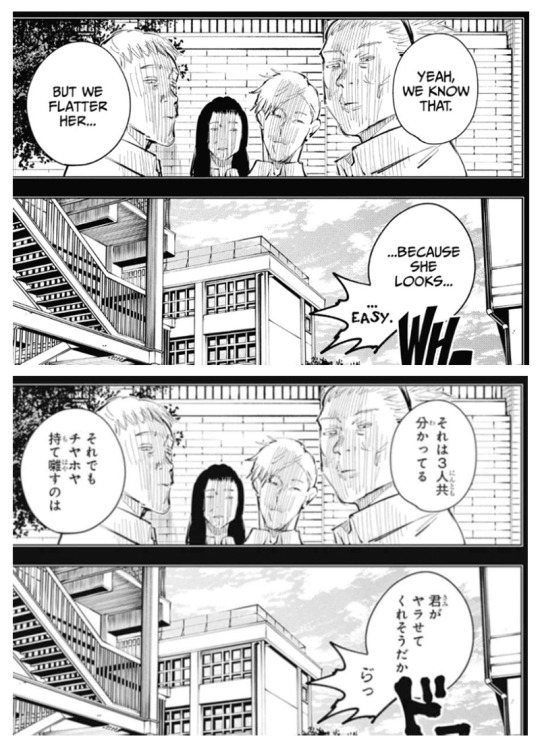
J:”Yeah, we know that. But we flatter her because she looks easy.”
⇒ ”And the three of them know it as well. But they flatter you exaggeratedly anyway because they think you’ll let them do you”
Actually Junpei’s lines.
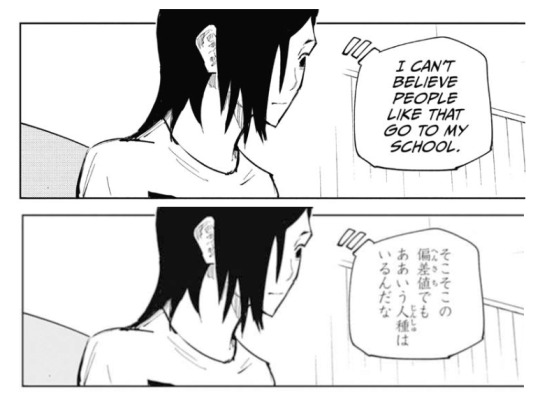
J:”I can’t believe people like that go to my school.”
Not incorrect, I just want to point out that Junpei didn’t just say “people”, the word he used is “race” (人種), which implies he doesn’t see them as the same kind of human he is.
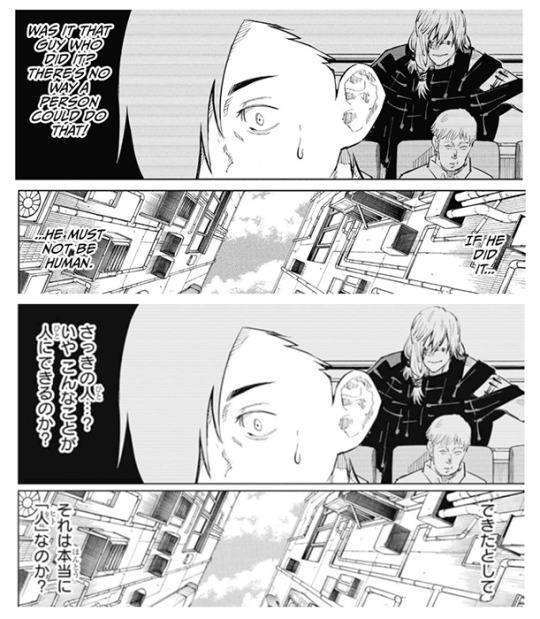
J:”Was it that guy who did it? There’s no way a person could do that! If he did it, he must not be human.”
⇒ “Was it that person just now? No, would such a thing be even possible for a human being? And if it was, would they really be a ‘human being’?”
Overall correct but the flow was different. Mind you, 人 can be translated both as “person” and “human being” (among others) depending on the context. Imo this captures the nuance better but YMMV!
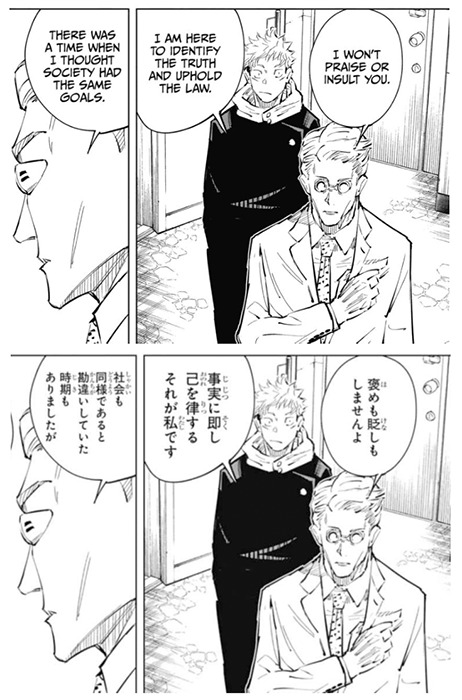
N:”I’m here to identify the truth and uphold the law. There was a time when I thought the society had the same goals”
⇒ ”Adapting to the facts [in front of you] and managing yourself accordingly. That’s who I am. There was a time where I mistakenly believed society operated on the same basis.”
This was really hard to translate, especially since the phrase Nanami uses here is rather formal language. I actually checked the official anime subtitles for this one and they went with “I adhere to the facts and judge on that basis”, which I guess is close enough? I’d probably go with it as well if not for the fact that he doesn’t just say 律する but 己を律する (己/onore = I/me in humble language).
Seems like the exact meaning of the phrase is difficult to understand even for Japanese people - there are whole articles out there breaking down the meaning and giving examples of how to implement it in life 8D Anyway, the simplest explanation is “to control yourself”, with further nuance of “enforcing rules on yourself in order to achieve a goal”, “restricting your desires and impulses by your own will” etc.
Thanks a lot, Gege.
Btw, Ino, who respects Nanami greatly and considers him a mentor, actually uses the same phrase, word for word, in ch. 95! (事実に即し、己を律する) That’s how important it is. Also, continuity!

Y:”Let’s do it!”
N:”There’s no need to get excited”
⇒ Y:“Let’s go all out!!”
N:”No, if moderate’s enough, let’s just do it moderately”
They both used descriptors for just what kind of intensity they should approach the mission with. Imo, an important distinction because after they learn the full extent of the situation, Nanami takes back his words from this moment and agrees with Yuuji, going as far as to use the same words Yuuji did here.
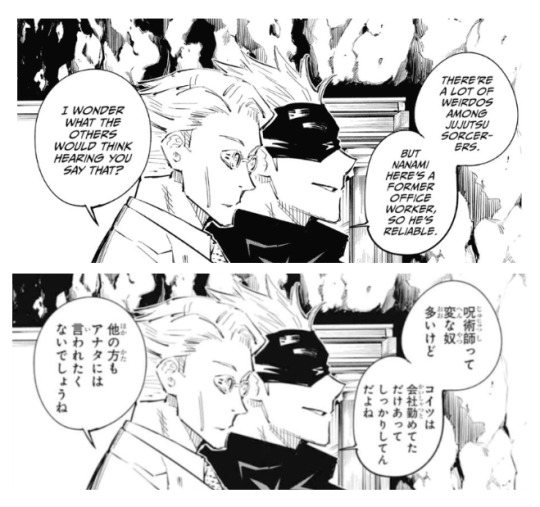
N:”I wonder what others would think hearing you say that”
⇒ “I’m sure the others wouldn’t want to hear that from you [of all people]”
So not so much “don’t be rude” as “dude, you’re the weirdest of them all”. Emphasis mine.
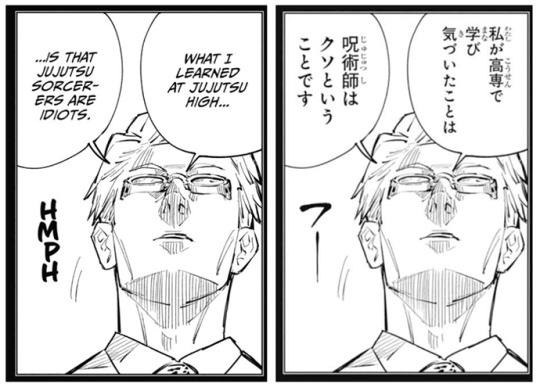
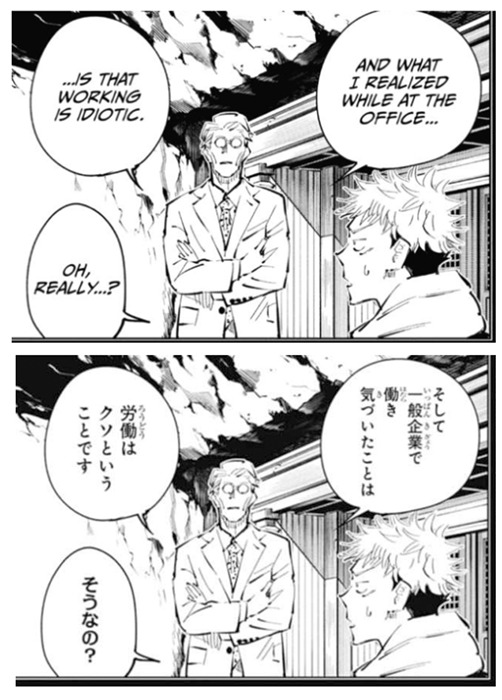
N:”What I learned at Jujutsu High is that jujutsu sorcerers are idiots”
& “What I realized while at the office is that work is idiotic”
He actually says “shit” both times lol. If it was just the humour that suffered here, it still wouldn’t be too awful but unfortunately it’s not just that. The “sorcerers are shit” line gets recalled when Nanami’s facing death, trapped in Mahito’s domain, which makes it pretty damn important. It gets translated yet differently by the official release then, too, which further damages continuity I believe Gege intended for this.

”So I took the lesser of two evils. Nothing more, nothing less”
⇒ “If both are shit, then I just chose the one I’m more cut out for. That’s all as far as the reason for my coming back is concerned.”
I mean, if we realllllly insist on watering down everything that Nanami says (as JJK translators apparently did), then the basic meaning was conveyed but the original wording and nuance was closer to what I proposed.

N:”Prove to me that you can be useful in spite of the demon Sukuna inside of you”
⇒ “Give your best to prove that you’re useful despite carrying the bomb that Sukuna is.”
Considering how 2 pages later Nanami tells Yuuji that he’s not the one Yuuji should be proving himself to, it’d have been weird if this is actually what he’d said, wouldn’t it. But Nanami’s nothing if not reasonable, so that wasn’t the case.
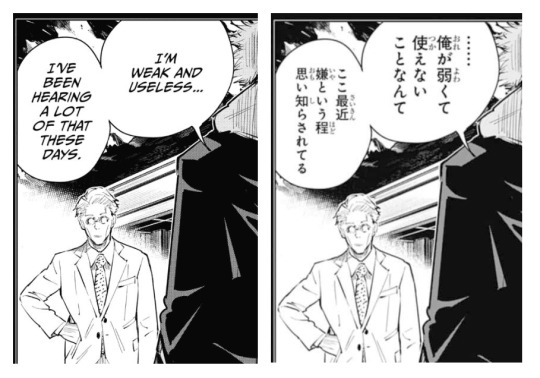
Y:”I’m weak and useless. I’ve been hearing a lot of that these days”
⇒ “That I’m weak and useless... I’ve been realising that to a painful extent these days”
“I’ve been hearing it” would imply that someone was actually saying it either to Yuuji himself or to others which he was aware of. (I mean, other than Sukuna.) The original wording doesn’t really hold such connotation.
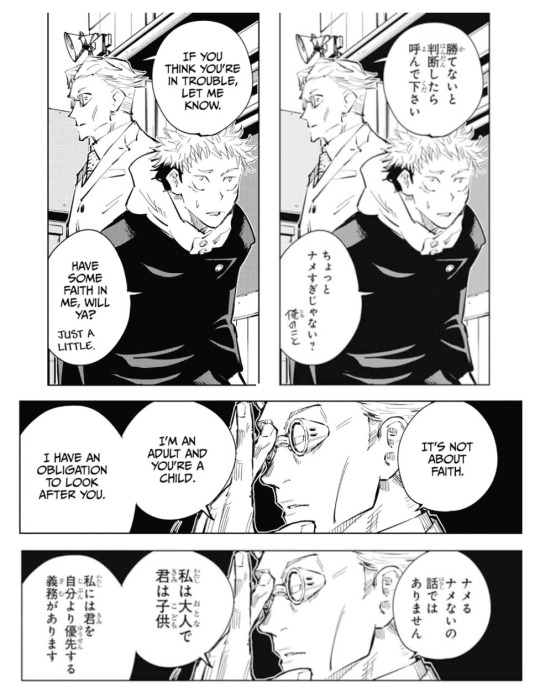
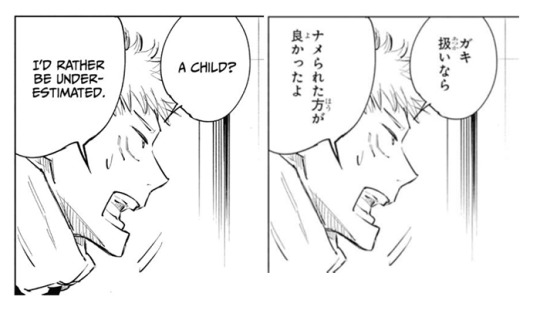
N:”If you think you’re in trouble, let me know”
Y:”Have some faith in me, will ya? Just a little.”
N:”It’s not about faith.(...)”
Y:”A child? I’d rather be underestimated”.
⇒ N:“If you decide you cannot win, please call me.”
Y:”Aren’t you underestimating me too much?”
N:”This is not about ‘underestimating’ or ‘not underestimating’.(...)
Y:”[Even] being underestimated would’ve been better over being treated like a kid.”
I guess the translators wanted to avoid saying “underestimate” 3 times in a row? Albeit that’s what the original does.
More importantly though!!
N:”I’m an adult and you’re a child. I have the obligation to look after you”
⇒ “(...) It’s my obligation to prioritise you over myself.”
Quite a different nuance, right. Not just “I have to look after you” but “your well-being [life] takes priority over my own”.
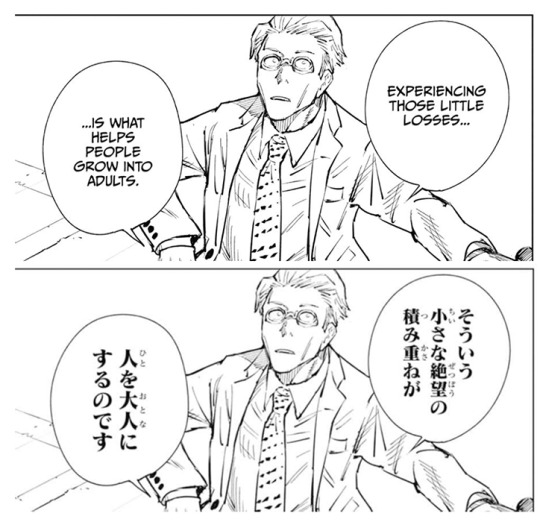
N:”Experiencing these little losses is what helps people grow into adults”
⇒ “It’s the accumulation of such small despairs that turns people into adults”
Not that wildly different but despairs (hopelessnesses) >>> losses, y/y. Also “helps” made it sound more positive when it’s both a poignant and at the same time dry statement.
Chapter 20
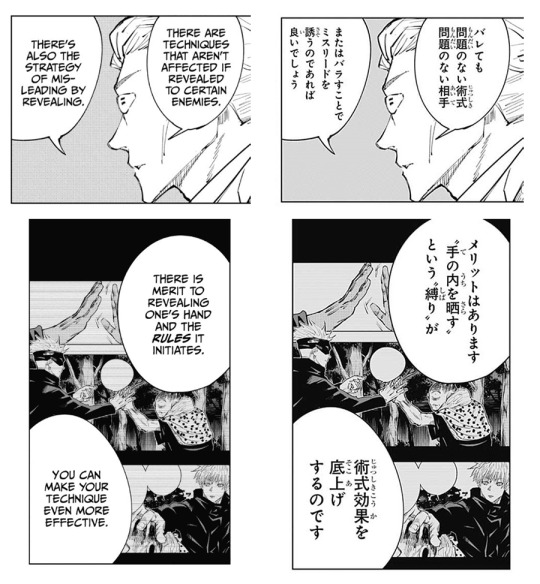
N:”There are techniques that aren’t affected if revealed to certain enemies”
Those two feel more like separate examples to me. I.e. that there are techniques that aren’t affected if revealed, and there are some enemies that you can afford to reveal your technique to. Could apply simultaneously but don’t necessarily have to, if that makes sense?
“There is a merit to revealing one’s hand and the rules it initiates. You can make your technique even more effective.”
⇒ “It has its merits too. The ‘binding’ of ‘revealing one’s hand’ amplifies the effectiveness of your technique.”
Wild lost “binding” appears! Like I indicated before, it’s the lack of consistency to translating terms that are consistent in the original, that has negatively affected the fans’ ability to understand the basics of jjk techniques and world-building.
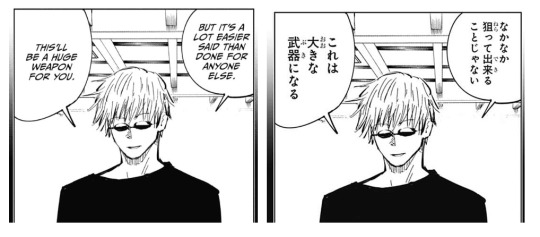
[Explaining Yuuji’s divergent fist]
GJ:”But it’s a lot easier said than done for anyone else.”
⇒ “It’s not something that can be easily done on purpose”

N:”His physical strength is superhuman. The impact of his hit doesn’t have incredibly strong energy, but it’s still about 20% more than a normal sorcerer. That means his delayed hit comes from his main source of cursed energy. It must be quite annoying for those on the receiving end. Such potential. If he’s able to go out all and combine his full physical strength with a cursed technique…”
⇒ “(...) The initial impact contains little cursed energy but it still achieves 120% of an average sorcerer. And then the actual cursed energy hits with a delay. For those on the receiving end it must be more unpleasant than one could imagine. And he’s got potential for growth, too. If he becomes able to add 100% of cursed energy to a 100% body…”
Uhh, this was a tricky one because on the first read it doesn’t seem that terribly wrong but when you read the original carefully, you realise this and that got lost in translation. My version should be closer to the original meaning.
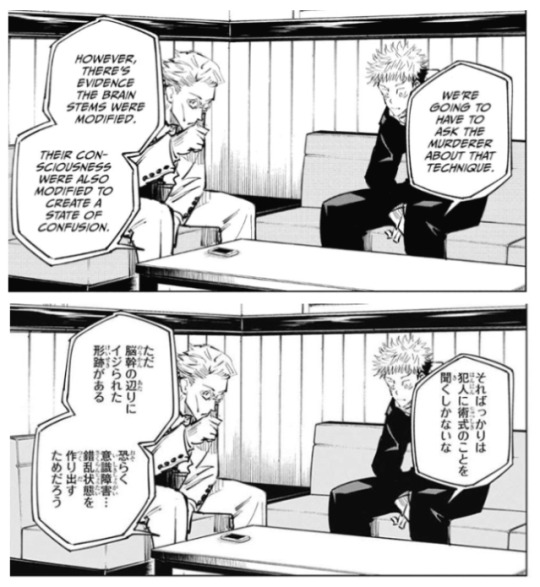
I:”We’re going to have to ask the murderer about the technique”
⇒ “That’s just something that you can’t know unless you ask the offender about their technique”
Obviously Ieiri wasn’t suggesting to literally ask the murderer.
“However there’s evidence the brain stems were modified. Their consciousness were also modified to create a state of confusion”
⇒ (...) This was probably done to create a disturbance of consciousness... a state of mental confusion”
Slightly different nuance for this one.
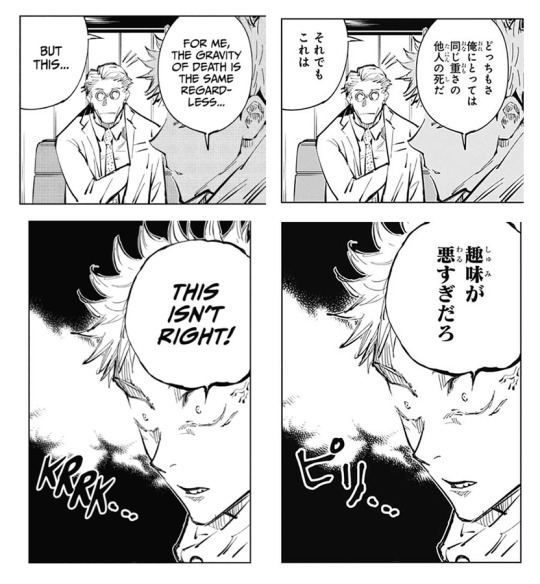
Y:”For me, the gravity of death is the same regardless. This isn’t right!”
First sentence is mostly correct but it should’ve been “the gravity of death of another person” (emphasis mine).
Second sentence sounds too mild for what is actually Yuuji being super mad specifically about the way those people were killed? The phrase he uses means something like "This is just in way too poor taste”, “way too vulgar” etc. I guess if you went for a less literal translation, you could say “just too disgusting”/”revolting”.
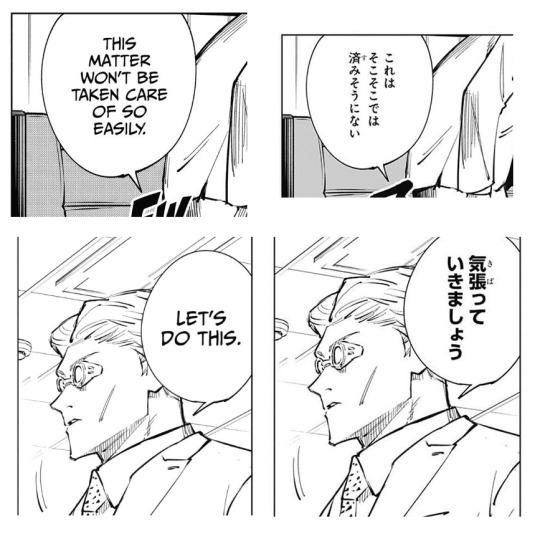
N:”This matter won’t be taken care of so easily. Let’s do it”
⇒ “Looks like ‘moderately’ won’t be enough here. Let’s go all out.”
This is the instance of Nanami retracting his words and backing Yuuji up by borrowing his own words that I mentioned earlier!
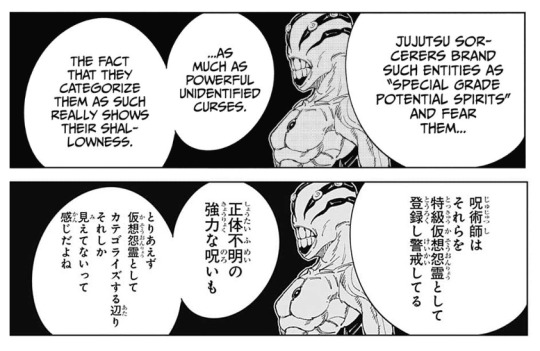
M:”Jujutsu sorcerers brand such entities as “special grade potential spirits” and fear them as much as powerful curses. The fact that they categorize them as such really shows their shallowness”
⇒ “Jujutsu sorcerers register them as “special grade potential apparitions” and remain on alert against them [on alert for their appearance]. The same applies to powerful unidentified curses. That they categorise them as ‘potential apparitions’ just shows how little they truly see.”
It’s not that sorcerers fear them per se but that they (most likely) monitor them and are on guard against them. When followed up by the “what people truly genuinely fear are natural disasters [forces of nature]” conversation, it becomes clear that what Mahito scorns sorcerers for is their short-sightedness for thinking all powerful curses must be born out of people’s imagination, ~urban legends~ etc.

[Junpei asking what Mahito was born from]
M:”Thanks to the hatred spewed between people I was born”
⇒ “I’m a curse born out of the fear and hatred people harbour towards [other] people"
or even
“I’m a curse born out of people hating and fearing people”
Again a quite different nuance. They really shouldn’t have edited “fear” out.
Chapter 21
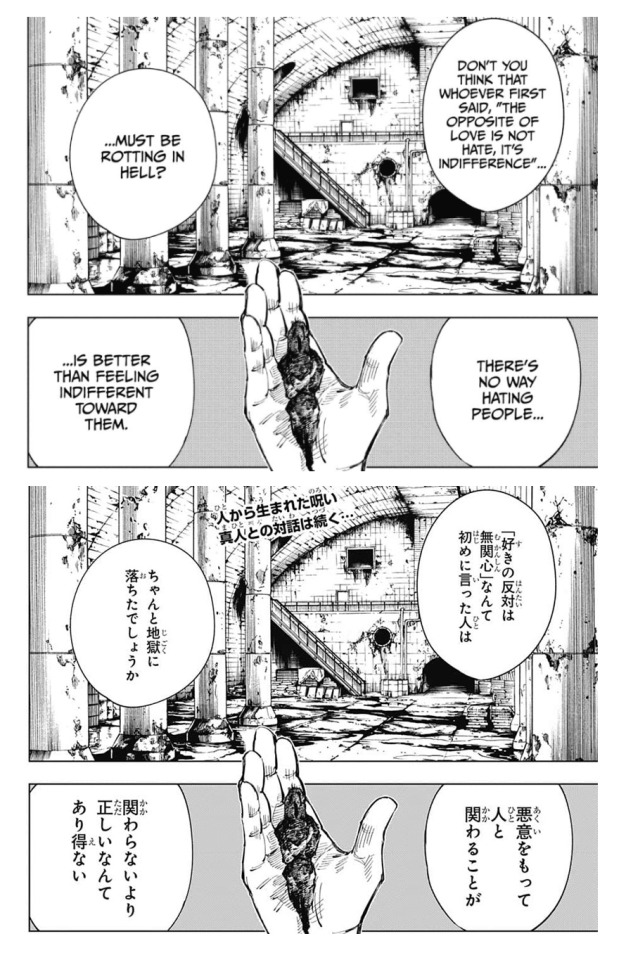
J:’Don’t you think that whoever first said, ‘The opposite of love is not hate, it’s indifference’ must be rotting in hell? There’s no way hating people is better than feeling indifferent towards them.”
⇒ “(...) There’s no way that approaching others with evil intentions is better than not interacting [with them] at all”
The first sentence is mostly fine although the original doesn’t include the “is not hate” bit, it only says “the opposite of love is indifference”. The second part is quite different. After all, hating doesn’t necessarily imply there’s any action taken.
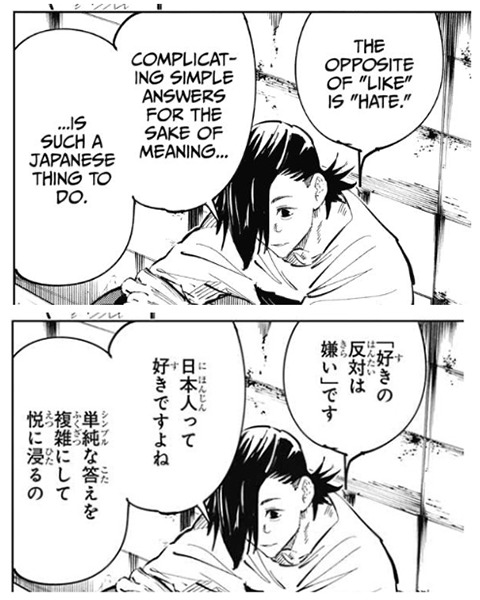
“Complicating simple things for the sake of meaning is such a Japanese thing to do”
⇒ “Japanese sure love it - complicating simple answers and gloating in it”
I didn’t like the “for the sake of meaning” bit, imo it’s over-interpreting.
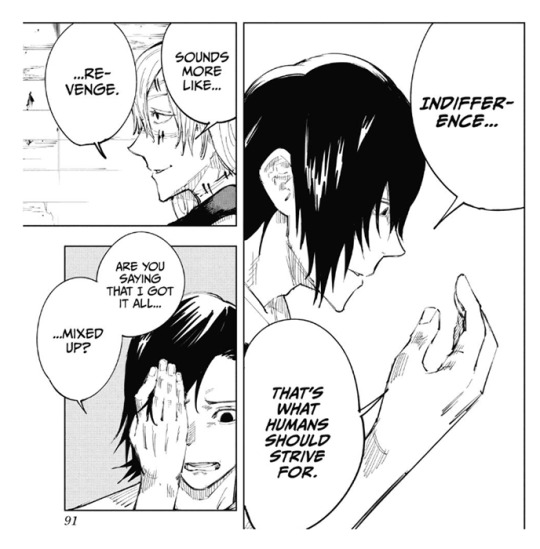

J:”Indifference. That’s what humans should strive for.”
M:”Sounds more like revenge”
J:“Are you saying that I got it all mixed up?”
Junpei’s first line here is fine although interestingly enough he puts it as “a virtue humans should strive for”. Then it’s
⇒ M:“And yet you wish for revenge”
J:”Are you trying to say I’m contradicting myself?”
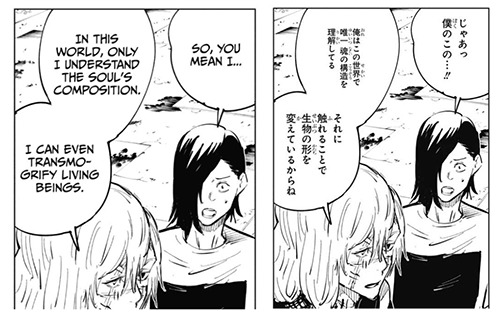
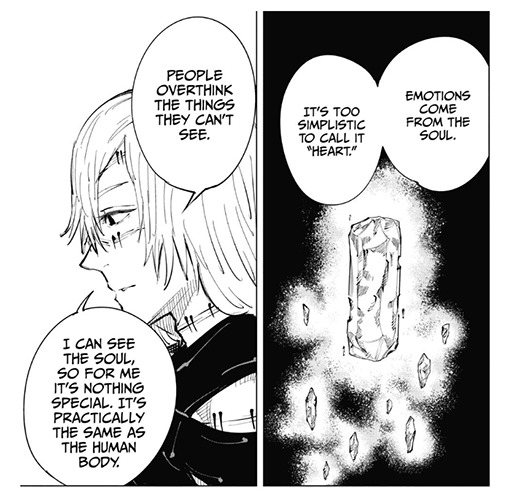
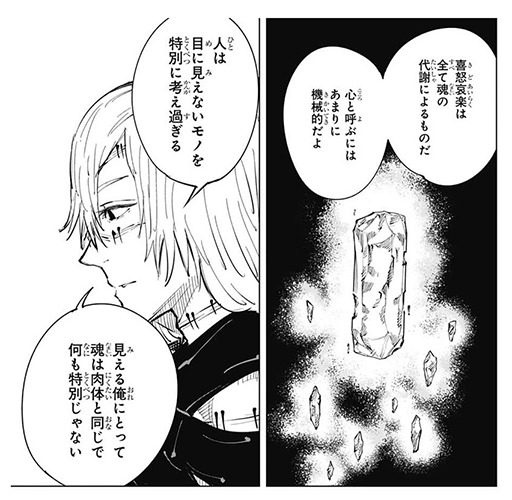
M:”In this world, only I understand the soul’s composition. I can even transmogrify living beings. Emotions come from the soul. It’s too simplistic to call it ‘heart’. People overthink the things they can’t see. (...)”
⇒ “In this world I’m the only one who understands the soul’s composition. After all, I change the shape of living beings by touching it. Emotions are products of the metabolism of the soul. It’s altogether too mechanical [of a process] to call it a heart. People assign too much value to things invisible to the eye.(...)”
Last one is literally “consider ‘special’ way too much”, simpler wording than what I went with but I tried to make it more legible.
The “metabolism of the soul” phrase is especially vital because Junpei throws it at Yuuji almost word for word when confronted by him at the school after his mother’s death.
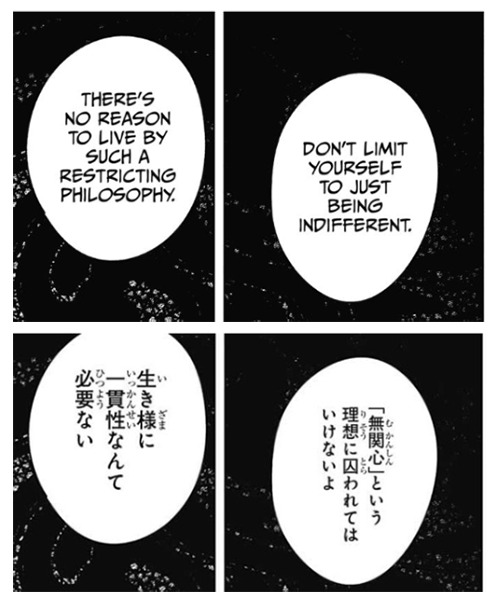
More philosophy lessons from Mahito-sensei \o/
“Don’t limit yourself to just being indifferent. There’s no reason to live by such a restricting philosophy.”
⇒ “Don’t allow yourself to be shackled by the ideal called ‘indifference’. There’s no need for there to be consistency in one’s way of life.”
Mahito actually takes the “is ‘consistency’ necessary” stance a few times in the manga, including when he and Getou squabble about the relationship between the body and the soul in Shibuya. A pity about the mistranslation here.

“I support everything you represent, Junpei”
⇒ “I’ll affirm your everything, Junpei”
Imo the act of supporting and the act of affirming while similar aren’t one and the same, hence the change.
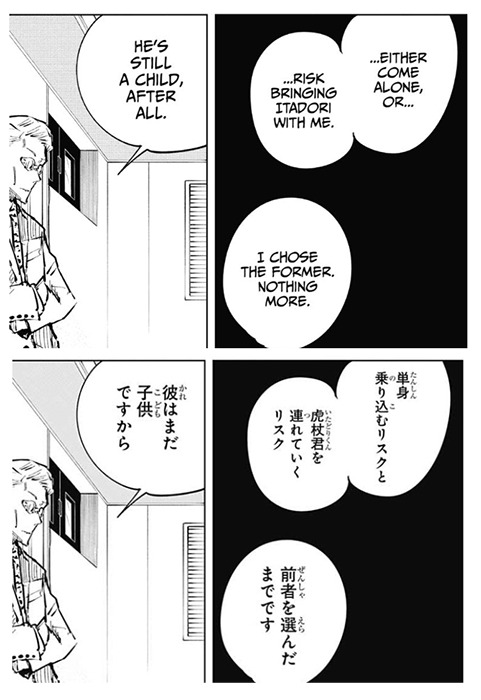
N:”Either come alone, or risk bringing Itadori with me. I chose the former, nothing more. He’s still a child, after all.”
⇒ “The risk of venturing [into the enemy’s territory] alone, or the risk of bringing Itadori-kun with me. I simply chose the former. He’s still a child, after all.”
Idk, I feel like cutting out “the risk” from the first option makes Nanami sound more callous? Like Yuuji’s a liability and going by himself is a sounder option. Whereas, it was actually him weighing two risks against each other and deciding that potentially endangering Yuuji is the one he can afford less.
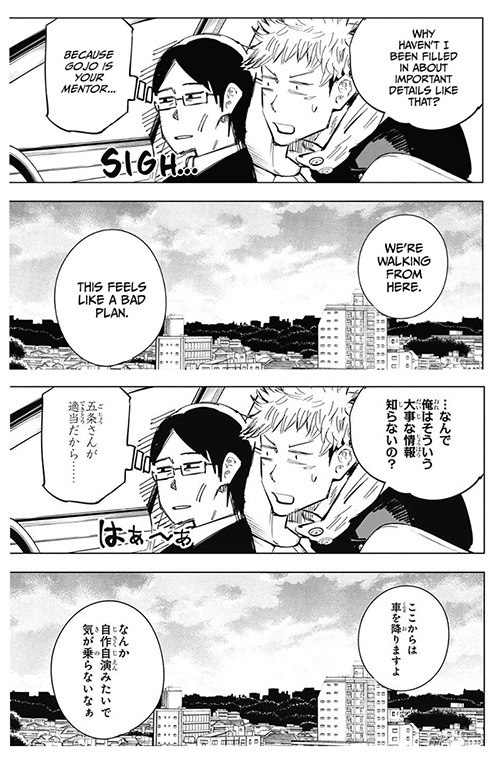
[After Yuuji asks why he doesn’t know important jujutsu related stuff.]
I:”Because Gojou’s your mentor.” ⇒ “it’s because Gojou’s ...”
He actually uses a lovely adjective to describe Gojou, which can mean a plethora of things, including: irresponsible, sloppy, lazy, unreliable, careless, perfunctory etc. etc.
Ichiji? Not a member of Gojou Satoru Fanclub.
Y:”This feels like a bad plan”
⇒ “This feels so staged, I don’t like it.”
Lit. “play [perform, read] one's own work”. I think what Yuuji might’ve meant here was that the plan felt dishonest? Second sentence could also be “I don’t feel up for it.”
Chapter 22
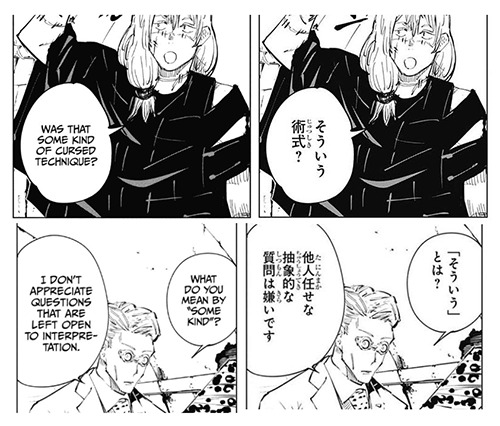
M:”Was that some kind of cursed technique?”
N:”What do you mean by ‘some kind’? I don’t appreciate questions that are left open to interpretation”
⇒ “(...) I hate abstract questions that put the whole burden on the other person”
Lit. “that leave it to others”. Other than Nanami being more straightforward with “hate”/”dislike”, I think this was him expressing he doesn’t like people who don’t even try to think for themselves and immediately demand answers from others instead.
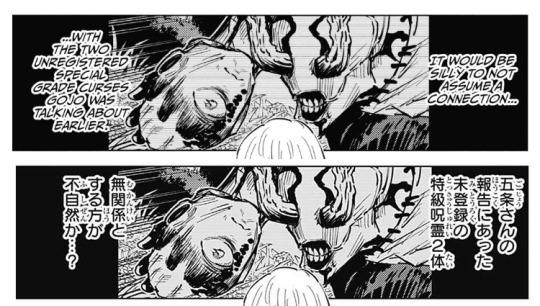
“It would be silly to not assume a connection(...)”
⇒ “It would be more unnatural not to assume a connection(...)”
Different wording (unnatural instead of silly), which imo affects Nanami’s characterisation.
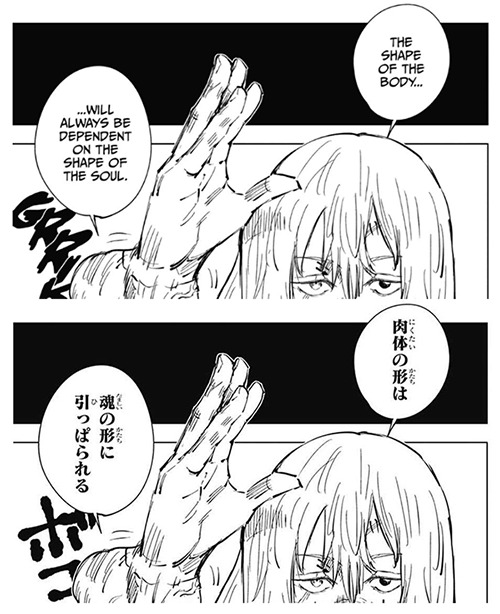
M:”The shape of the body will always be dependent on the shape of the soul”
This sounds a bit too passive and generic? Closer to “The shape of the body gets pulled along by the shape of the soul”, which is literally what Mahito’s technique does.

I’m heavily paraphrasing but!
magazine raw scans: ”it's 6:30 PM now and I started working at 11 AM, so I'm going to finish by 7PM no matter what”
official English release:”it's 5:30 PM now and I started at 10, gotta finish by 6”
The time change is so random, I wonder if Gege simply changed it themselves for the volume release. Maybe to bring it closer to the common office job times? Typical Japanese work day at the office begins at 9AM and lasts 8h + 1h break (completely unpaid but compulsory). I guess if Nanami skipped the break then working 10AM-6PM would make it exactly 8h?
The biggest mystery of jjk.
Chapter 23
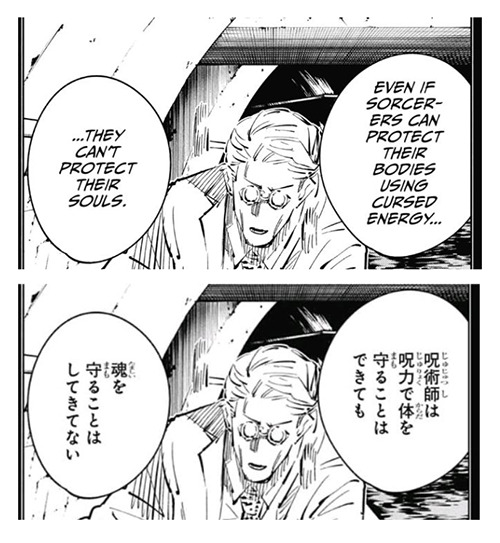
M:”Even if sorcerers can protect their bodies using cursed energy, they can’t protect their souls”
⇒ “Even if sorcerers can protect their bodies using cursed energy, they [just] aren’t used to protecting their souls”.
So it’s not that they “can’t” as in “are incapable of” and more that there’s never been the need, so they never learned how and aren’t used to doing it. As proven by Yuuji later it’s not impossible.
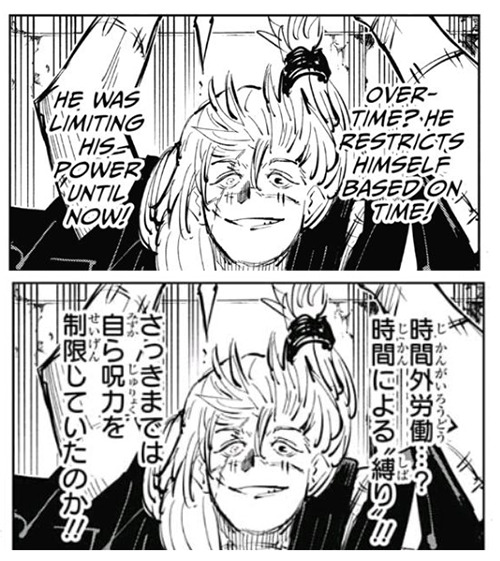
M:”Overtime? He restricts himself based on time! He was limiting his power until now!”
⇒ “Overtime work? A ‘biding’ based on time! He was suppressing his power by himself until now!”
Another instance where “binding” as a term makes its appearance (it even uses quotation marks) but wasn’t properly denoted by the translators.
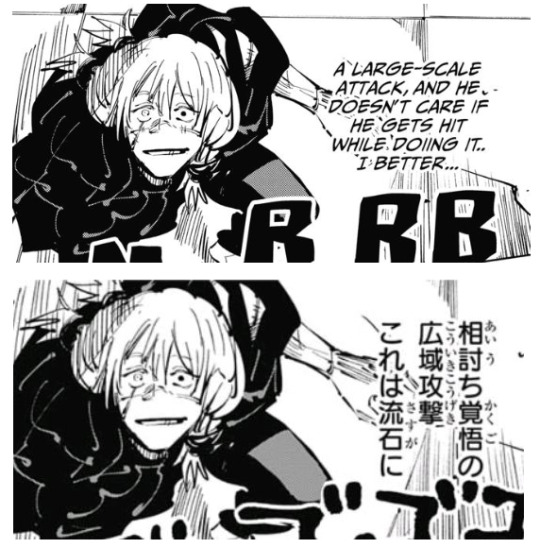
M:”A large-scale attack, and he doesn’t care if he gets hit while doing it!”
⇒ “A large-scale attack [done] with the resolve of [potentially] getting killed along with me!”.
The phrase Mahito uses here is 相打ち, lit. “killing [hitting] each other at the same time”. Also, “doesn’t care” and “is prepared/has the resolve” are quite different, aren’t they.
Chapter 24
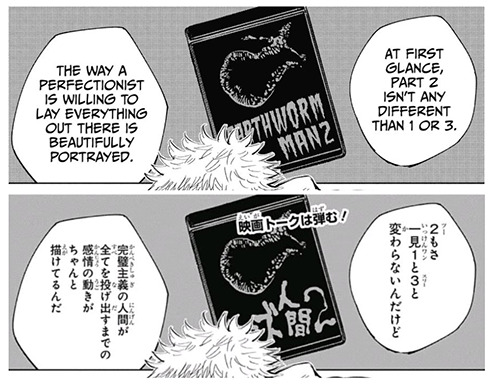
J:”The way a perfectionist is willing to lay everything out there is beautifully portrayed”
⇒ ”The change in emotions [leading up] to a perfectionist abandoning everything is properly portrayed here”
I’m including this because knowing Gege, it’s not just simple movie talk, and it’s actually foreshadowing Yuuji’s future fate or something 8D
I can’t decide if it’s “abandon” (also “throw out of the window”) or “sacrifice” because the word used can mean either. I’m leaving that to everyone’s interpretation.
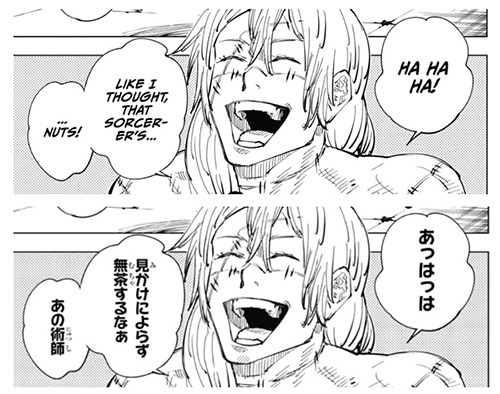
“Like I thought, that sorcerer’s nuts!”
⇒ “He doesn’t look it but he sure does reckless things, that sorcerer”
How does "he doesn't look it but (...)" even become "like I thought (...)"? He was laughing at and enjoying the contrast between Nanami's appearance/attitude and his actions/fighting.
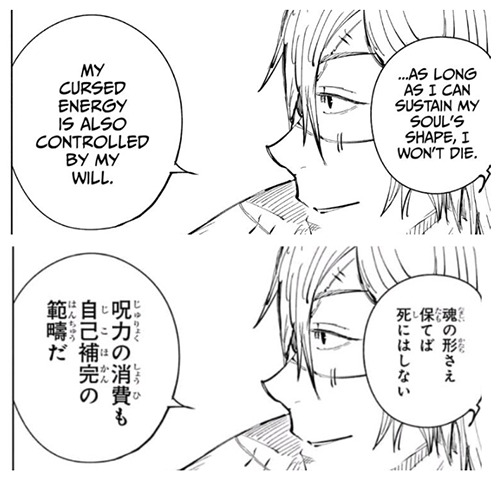
M:”My cursed energy is also controlled by my will”
⇒ “The spending of cursed energy too is among things I can supply by myself.”
I’m not entirely sure because it’s a tricky one, so take this one with a grain of salt. But the official release is definitely missing “spending/expenditure” and Mahito isn’t talking about using/manipulating his cursed energy in general but “the amount of cursed energy spent”.
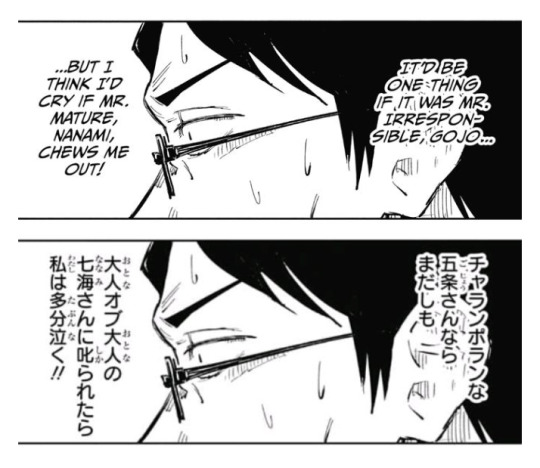
“Mr. Irresponsible Gojou” ⇒ “Devil-may-care Gojou-san”
“Mr. Mature Nanami” ⇒ “The adult of [all] adults Nanami-san”/”the adult above all adults”
I just really enjoy Ichiji and his little epithets, I guess.
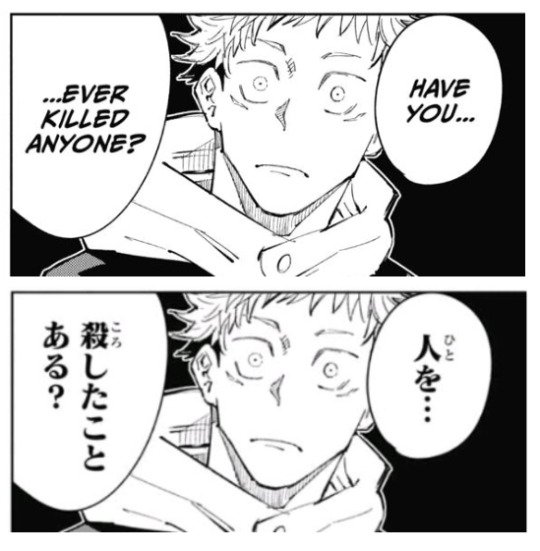
J:”Have you ever killed anyone?”
⇒ “Have you ever killed a human being/another human?”
Just putting it out there because imo there's a distinction between “anyone” and “a human being”. Especially considering how much of this arc was questioning what being a human means.
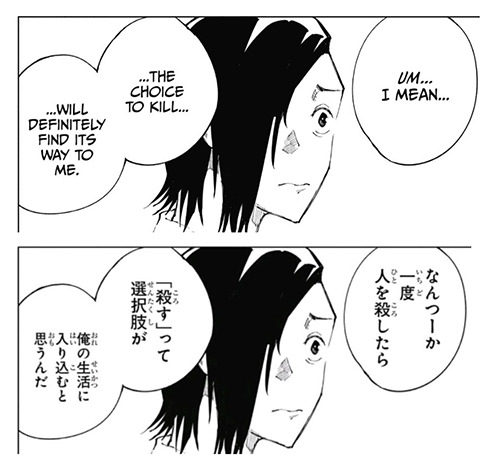
Y:”Um… I mean, the choice to kill will definitely find its way to me”
⇒ "How to put it... once I've killed someone, "killing" would become one of the possible options [to take] in my life".
Maybe the nuance was there in the official release too and I just didn't pick up on it but to me the former makes it sound more like he’s saying "I may still have to kill one day". Whereas the original seems to hold the connotation that if you do something once - even if it’s something as horrible as killing another human being - it becomes easier to do it again in the future because it's a choice you've made before, it's not untouchable anymore.
Chapter 25
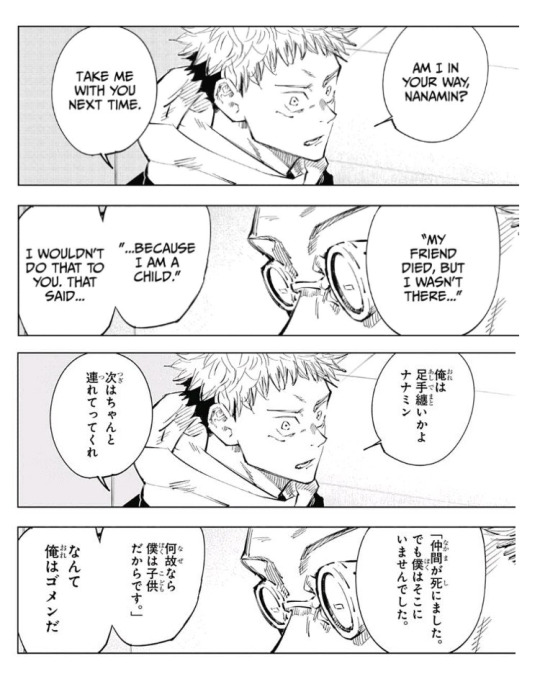
[Yuuji expressing his regret over Nanami choosing to go fight Mahito alone.]
"Am I in your way, Nanamin?”
⇒ “Am I a burden [to you], Nanamin?”
A different nuance for this line.
“’My friend died but I wasn’t there because I’m a child.’ I wouldn't do that to you. That said"
⇒ "’My comrade died. But I wasn’t there. Why? Because I am a child.’ I would hate something like that" [to be put in such a position]
And this is just pure mistranslation. The whole “my comrade died but I wasn’t there because I’m a child” line is actually Yuuji painting a possible scenario (he does it with short sentences but the speech is overall polite). What they translated as “that said” was actually a follow-up to that scenario and could be translated as “something like that”.
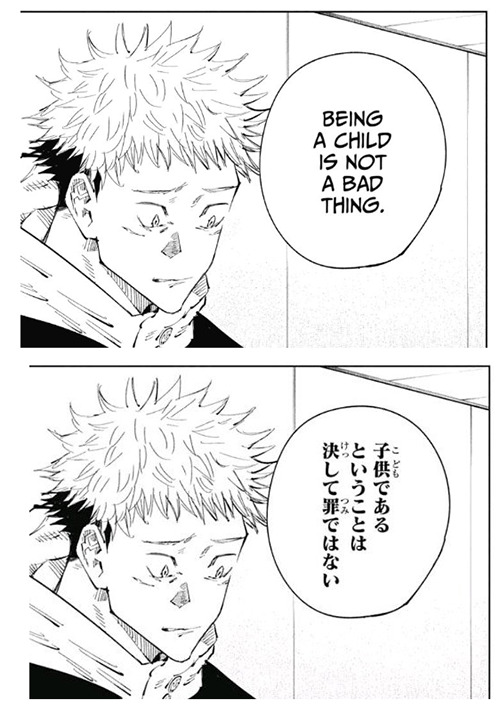
N:”Being a child is not a bad thing”
⇒ “Being a child is in no way a crime”
I wanted to point this out since the original word’s most common meaning is actually “sin”, which is significantly heavier than just “not a bad thing”. Could also go with a milder “is not something to feel guilty about” here I guess.
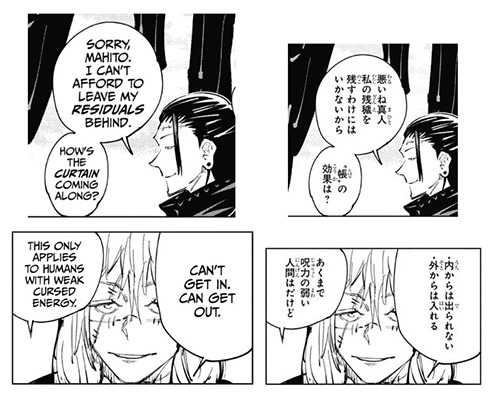
G:”How’s the curtain coming along?”
M:”Can’t get in, can get out. This only applies to humans with weak cursed energy.”
⇒ G:”What’s the effect of the ‘curtain’?”
M:“Can't get out from the inside, can get in from the outside. (...)”
Literally the opposite for the curtain’s effect. Emphasis is Gege’s, too! Also Getou’s question was actually about how exactly the curtain in question would work, and not just how it was coming along.
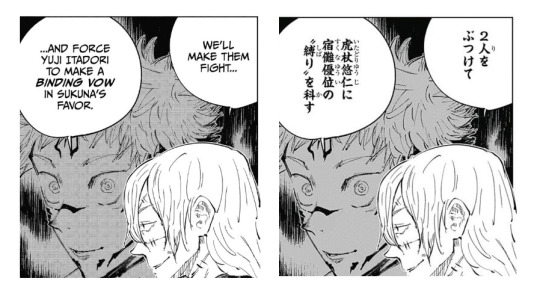
M:”We’ll make them fight and force Yuji Itadori to make a binding vow in Sukuna’s favor”
Just to reiterate, whenever “binding vow” appears, it’s actually just “binding”.
[to part iii (2/2)]
[to part iii (2/2)]
90 notes
·
View notes
Note
I'll try to keep it short because you're very kind but I'm becoming annoying... I actually like Soichiro. It's his morals I cannot stand. In fact, in line with his, I like Matsuda's and even Light's variations more, even with all the darkness they entail, because they're more critical. I adore L and find him relatable, but I'm not so sure if I'd like him as a person in real life, and yet I again like his morals more than Soichiro's. I still think Soichiro is generally a better person than any of the others. I still dislike his morals the most. When I say at the opposite end of Soichiro in the moral spectrum is where Near stands I'm not talking just about my personal liking, but as I interpret their views on morality. Maybe there's some detail of the manga I'm forgetting (I truly have to reread it), but Soichiro didn't seem very critical about... anything, while Near states something like "even if god came and told me this is good and this is bad and this is The Truth I'd still consider and come to my own conclusion". I like that. I care less about someone getting a moral with what I may consider a degree of grey if they do that. I myself have very strong morals that nonetheless have degrees of grey; strong doesn't mean pure. My grey and someone else's grey might be very different. But I've developed them, not accepted them blindly. Near of course, Mello, L, and even Light and Matsuda do this, but Soichiro generally doesn't. And I dislike that greatly. In fact, I think I'd find him kind in real life, and likeable, but I'd not really like him because I can't really bring myself to like someone like that even when they're kind and compassionate and good. I'm already talking more than I intended but I'll try to point out what bothers me of his attitude.
Soichiro is very very anti Kira, but he's working for a government with the death penalty and he doesn't seem to consider that even for a moment. For him, that the government does it is justifiable but monstrous if a person does it. He doesn't really have a justification, it's just like that because it's as it is. He's very against L's methods, buy L uses people who were going to die anyway at the very moment he uses them either way because of the death penalty, because of the government. From a government pov, if the government were to do what L does, it'd be something terrible. From an individual pov? Not so much. It's ugly, but it's beyond himself whether that people die or not, and his decisions are easily justifiable from an individual pov: they're going to die irrevocably, that very day at that very time, and he is using what he can to solve a very complicated case that is taking many lives, and he even might use the moral support of "I'm giving the prisoners the chance of choosing, with the potential reward of lifelong imprisonment instead of death". And again, while a government doing that is terrible, it's not as terrible for a person. L is a private detective, an individual. People can be fallible. Governments shouldn't. What L does might be justifiable, if ugly, for a person, but it would be unforgivable for the government to do. But the government lies on L and it's L who takes the slander of the rest of the Task Force. And that's what Soichiro doesn't see, and that's what bugs me. Soichiro sides with the government and the laws no matter what, no matter if they're terrible and are actually the cause if indirectly of the terrible things L is able to do (I'd have to reread to be completely comfortable affirming this, but Soichiro's attitude towards the government reminds me a bit of Mikami and Misa to some extent).
Soichiro hates Kira, and hates and criticises L's methods and his ruthlessness, but doesn't even consider for one moment the problem is not L. The problem is not the 24 yo boy/man, the problem is his government, that has the dead penalty and actually let's a private detective carry on with the investigation and do as he pleases (and I'm not even taking into consideration how L's upbringing and the lowkey if fun exploitation he was subrmited to have most probably influenced if not determined the way he acts in these cases, because while it's intriguing it'd feel like justifying L out of pity, and either way Soichiro doesn't know that; but I mention this because L's entire past at Wammy's, like the other children's, is another very terrible move from governments and adults in responsibility positions). The problem is Interpol, the governments in general, blatantly saying L is ruthless but not even setting rules when working with him. And I think it would actually have been very easy to stop L doing those things. Just change the rules of the game, tell him beforehand there are a few things he can't do. It's a game after all. Of course L would still exploit the moral and legal vacuums of the rules as he pleased, as one does when playing anything, but the government wouldn't have given him totally free way.
I'm not sure if I'm explaining myself very well. Years ago in a class I talked about the difference between personal vengeance and the death penalty. I feel this is similar. A person is fallible. A government should be able to stand over licit murder. L manipulating people to prove a point is ugly. A government doing that or letting someone free way to do whatever is terrible. L does whatever, and as an individual is not so horrible as it is that the governments internationally actually let him do whatever even knowing beforehand without setting rules. Soichiro sees this and it doesn't even cross his mind for a moment to criticise the government he's working with. Also, he considers his morals the best, which makes sense in a first person pov (why support x morals if you don't think they're the best? I'm not critisising this), but he's very... imposing about them, while as I say not being precisely the most critical thinker. That Soichiro is like this, morally (I'm not even talking about the policeman aspect though that's so often talked about in the fandom), makes a lot of sense to how Light ends up being Kira, and with how Matsuda thinks and acts. And I find that very intriguing, but I can't stand Soichiro's simplistic morals and his better-than-you attitude even though he's a generally good person. That's why I dislike his morals the most (of course you don't have to agree!). I don't stand by Near's morals either, but I like his "god could come and tell me and still I'd doubt" attitude. It's what makes gods mad in basically every mythology, but I love that kind of thought process. I'm very much like that too.
I'm so sorry this is so long. I tried to cut, but I got the impression it'd make it even less clear or more difficult to understand. Or maybe the lack of clarity lies precisely on how repetitive and long this is. I'd like to think English not being my first language has to do with this, but honestly the problem is most probably just me. I hope I made the point understandable enough, though. And thanks for your patience. I really liked that post of Near someone sent as an opinion and how you replied! Very interesting takes on both ends.
Hi again! You have some very thought-provoking points about it all, and don't worry, your English is excellent.
I loved Near's stance about these things as well, and that's something that really bothered me when growing up about some authority figures and institutions being really totalitarian and silencing of doubts or stances they deemed too negative or incorrect to voice aloud. I value having freedom of choice and the ability to think critically about everything immensely. Maybe it's because I went to a very strict and sheltering and weird little school as a child that tried very hard to indoctrinate me with a specific worldview, and always shamed and silenced anyone who disagreed or questioned them or felt like an outsider or wanted to have a different point of view. I remember relating the most to Matsuda on the task force when I first watched the show as a teen, because he was always speaking up with his devil's advocate questions or confusions. The way Soichiro and the others usually yell and scold and shame him for this bothered me a lot, because I wanted them to discuss things openly so I could see all the different sides of the arguments more clearly. Actually, I think this is a pretty culturally similar thing between Japan and Canada (where I am from). There's a strong emphasis on doing what's best for the entire group instead of just yourself, and being too controversial or outspoken or individualistic about certain things is often taboo and frowned upon as a big social faux pas. It's possibly quite a bit stronger pressure toward obedience and conformity and politeness in Japan in certain ways as well, but I don't know for sure as I haven't lived there myself.
I think Soichiro had a bit of nuance and flexibility with his morals and his stances in various instances throughout the plot, and to me he seemingly tries hard to see things from other angles during complicated moments in what must be one of the most difficult situations he could possibly face as both a police chief and a parent. But it's true he never seemed to doubt that upholding the laws already in place and the way his government punishes the convicted were the "correct" ways society should function. I think this series would be a really interesting one to discuss in a class that talks about stuff like justice and the death penalty and law and ethics and such for how many of these things it touches on in an entertaining and thought-provoking way!
19 notes
·
View notes
Note
of all the things they could make mickey and ian fight over, why are the writers going with 2 so OOC storylines in the final season? the show never framed ian as seeing mickey's illegal income as not "real" work before. and mickey was never the slacker type, so why now? and mickey would never vague about monogamy. i'm so confused. if they gotta fight, why not over something in character and meaningful. this just feels like writers being mean to the fans, making us sit thru all this nonsense
Hey! Thanks for the ask. Made my (very weird and stressful) day.
I’m going to be disappointing right off the jump and say that I don’t actually think any of this is OOC, per say. But. In GENERAL. Shameless is not the show it was. I think this is very normal for long-running shows. Take Friends: When you get into the back half of that show’s extensive catalogue, is starts to feel like the characters are a Xerox of a Xerox. Early season Monica is a bit OCD, and a clean freak who loves to be in charge -- but she’s also warm, and hospitable and emotionally available to her friends. Late season Monica is often a coked-out squirrel-woman who loses her mind if someone moves a pillow. That’s quality isn’t out of character, but it’s no longer being balanced with the warm and supportive woman we initially met. I think a bit of that might be “we already know you either like or hate Monica, so we’re just giving you the stuff that’s funny and/or dramatic. We got 22 minutes and six characters and we don’t have to build that other shit anymore.”
I think that’s happening with Mickey and Gallavich. And I don’t think that’s weird for a) a show that has run this long and b) a character who was gone and then returned. They are giving us a Mickey that has always existed -- unbound by traditional manners, aggressive, blunt and obsessed with Ian Gallagher -- but we aren’t getting much of the Mickey who curls up with Ian at the worst time of his life and kisses his forehead. We aren’t getting all the verbal confirmation of Big Feelings they gave us when he came back in season 7. We aren’t seeing Ian and Mickey as a team, which is a big part of their mid-seasons dynamic. I think that makes people feel like these arguments are OOC, when they’re arguably reasonable issues, but aren’t being given a ton of nuance, or balance.
Aside: There’s some balance in how the actors are playing the intimacy and the physical affection. The little touches and kisses are appreciated by me.
So to dig into the OOC stuff -- first of all, it makes total sense to me that they’d have issues about the role crime plays in their lives together. I love that Ian never gave a damn that Mickey is a straight up criminal. But every time Ian lost Mickey, it was because the law intervened. When Mickey is not incarcerated, he’s with Ian. Ian is no longer 16, no one is a juvenile offender, Mickey was given a devastating sentence in season 6 -- 16 years -- Ian was 18! That was his entire living memory, if not more. They are married now, against considerable odds, and I completely understand why Ian doesn’t want Mickey to risk going back to jail.
Likewise, I get why Mickey doesn’t want to do what Ian is doing. Mickey does not have the temperament for minimum wage jobs. He has a longstanding history of thinking it’s absolute bullshit to work hard for no money. Particularly when he’s smart enough, skilled enough and ballsy enough to make a LOT of money in an afternoon just by spotting an opportunity.
Mickey has never SAID this on the show, but in canon we have seen him go to prison four times. Once, because Ian’s unhinged spurned groomer shot him; once because Mickey CHOSE to headbutt a cop so he could go to prison and avoid his dad; once because Mickey was consumed with a need to avenge Ian; and finally because Ian got himself tossed in prison, so Mickey CHOSE to join him. If Mickey has confidence that he won't go to prison if Ian isn’t a factor... Not the craziest idea.
So -- writers spitballing ideas for Gallavich conflict? I think that’s a pretty good one. Two clear sides that both have merit.
I’ve already written a bit about my thoughts on the monogamy issues... first, I’ve always figured they were monogam-ish, to reference Dan Savage. They are faithful to each other while they’re together, and when they are separated (usually by prison!) they aren’t. This isn’t the first time Mickey has voiced a lack of interest in being monogamous -- most notably “Great. Now we’re in a horror movie.” Mickey isn’t a traditionalist and I don’t think he feels like this is a make-or-break issue. But MOSTLY?
MOSTLY.
I really and truly believe what I’m about to say...
Mostly Mickey wanted to do what Ian wanted.
If he legit didn’t want monogamy he wouldn’t have tried to cheat of Ian’s paper. He didn’t like that “write it down and flip the paper” game. He wanted to match Ian’s answer. So he took a guess and he was wrong about what Ian -- who had literally just told him he found the concept of the rest of his life overwhelming -- had written.
This is my head cannon: I think he liked that Ian wrote down monogamy. This is not my head canon: they are SUPER sweet to each other in the next scene. I am not convinced that the monogamy debate is going to be much of a thing beyond that scene. And I understand that, for a lot of people, that scene was extremely unpleasant. To me, personally, it made sense for it to come up. But I think it’s settled. I think they’re done with it.
The one place where I’m like “What is this?” is the slacker stuff. I mean, I can meta why Mickey might be afraid of failure or whatever, but it’d be mostly head cannon. They haven’t given us a ton to build on there. The best we got is “Stop disappointing the people you love!” being what motivated Mickey to do something he didn’t want to do. But Mickey was right, if he thought that interview was going to be a disaster. Mickey knows himself and he is painfully aware of his limitations.
As for why are the writers DOING this? Well. Ok. Here’s what I think it is:
1. Story is conflict. So they needed one. And “struggle to adjust to marriage” really isn’t a bad one. Specifically, figuring out how to be married when you have no role models and have a few social strikes against you is a good one.
2. The writers are amused by Gallavich fighting. They think it’s entertaining. And while there are a lot of people out there for whom Gallavich is EVERYTHING, Shameless’s viewership is also made up of people who think Frank is hilarious. No one ever send me an ask about why Frank is hilarious. I will not be able to figure that one out and the research might kill me. We definitely don’t all agree on what is and is not funny.
3. They’re going somewhere with it. At least a little.
I don’t KNOW three is true, but here’s something I believe about John Welles. I think he’s a biiiiit of a sap. I think he probably wants to leave each Gallagher with something nice. I don't think his plan it to send everyone off on an ice floe to freeze to death. So I think (hope?) that what we’re going to see is three (maybe four?) episodes of Gallavich At Odds and then I think we’re going to move into them trying to work together to make lives together. And they will probably still fight, because that seems to be part of the Xerox of a Xerox of Gallavich. I’m sure many people will find that cringey and problematic and annoying -- but I also bet we get a few moments we love, here and there.
I don’t think they’re trying to be mean to the fans, but I think it’s serving 8 characters ... Nope. 9. (I forgot Frank. I always forget about Frank.) ... and we aren’t going to get the depth and breadth we want. And most of that will be on the side where we see Gallavich loving each other, because at this point they expect us to KNOW that. And some of it’ll be Mickey’s internal life because they tend to focus on the Gallaghers. But I do fervently hope we get a little more of that other side of the coin. Because I absolutely agree that one side is more fun than the other.
63 notes
·
View notes
Text
Top R&J Adaptation Pet Peeves
Adaptation is hard. Really, really hard. Shakespeare especially knew it; he was one of the best adapters for theater ever, and he himself adapted R&J from Arthur Brooke’s Tragedie of Romeus and Juliet. Since then Shakespeare’s play itself has been given the adaptation treatment and hooo boy, are there doozies, misses, and fascinating failures. Most are published fanfic flops, like the ones I reviewed for my blog, but others tend to be more complicated than that. So without further ado, let’s dive into the Top Adaptation Pet Peeves I’ve personally encountered, or simply tropes and patterns I find annoying.
The two families/groups not being alike in dignity. Yes, I’m looking at all the productions and adaptations that decide to switch the whole rival houses dynamic for a race or class one. The ones who pit a marginalized group against another marginalized group, like Romiette and Julio (Black/Hispanic respectively) are fine-ish. West Side Story also does this, but unfortunately the whole “white ethnic” gang is no longer a thing now, as most non-WASP ethnic white groups are considered functionally white nowadays, so it does become a problem re: the Puerto Ricans being the underdogs to the white ethnics. Some have done a poor/rich, privileged/marginalized dynamic, but you just can’t do it with R&J; it breaks the equality of the pairing. By far the worst of these is the anime Romeo X Juliet, which had the evil Montagues be the corrupt ruling power who usurped the throne from the Capulets (????). Look, the whole point is that the two groups’ differences are superficial and stupid, and that they are more alike than different. This doesn’t work if one group is favored/discriminated against over another. It also leads to disturbing implications—namely, justifying a dangerous and destructive feud and intergroup violence and hatred in general. Another side effect is that it ruins the mutuality of the lovers by bringing in unequal power dynamics where it isn’t needed.
Juliet as a #girlboss/badass/“strong female protagonist”. Many adaptations do some measure of this by having Juliet resist even the first mention of Paris, talk back to her parents and the Nurse, and, for Gong’s These Violent Delights (Juliette Cai as the dagger-wielding daughter of a gang) and the anime Romeo X Juliet, (Juliet crossdressing as the vigilante the Red Whirlwind) actually kick ass and generally “strong female protagonist”-it up. I think this is largely a reaction to Juliet’s canonically marginalized position as a sheltered 16th century maid, mistaking the passivity and lack of agency of her status as a character trait. As a result, we get CrouchingTigerHiddenDragon!Juliet. Just no. The original Juliet, as everyone should know like their own name, was no shrinking violet, but neither was she a YA/anime shonen dominatrix either, and I feel she wouldn’t be even in an AU. Also, by this point it’s so cliché. Juliet is so well-written as she is; why stuff her into this Katniss Everdeen peg?
Juliet as an immature ~bby. Not so much adaptation!dumb, thank goodness, but I’ve seen this small trend in play productions that take the “Juliet-is-thirteen” thing waaaaaay too seriously and either have a tween-looking actress or make the actress play Juliet a facsimile of what a thirteen-year-old is supposed to be like. I especially will never forget the Orlando Bloom production that had poor Juliet deliver her “Gallop apace” on a swing. Awful.
Mercutio being turned into either 1) wacky, comic relief gay or 2) a mystical/sad tragic gay. Mercutio occasionally gets done dirty in either of those two ways and it’s sad. That French Canadian film Roméo et Juliette is by far the most damning offender of the latter take. I don’t like either trope, and I certainly don’t like it for Mercutio, for whom it doesn’t really fit. Also, I feel it’s important to note that as the Prince’s kinsman Mercutio is the most higher ranked and privileged of the three, his being forced into a “sad, tragic gay” mold feels ludicrous. Even his death comes about because he wanted to avenge Romeo’s honor (or, well, more like he really wanted a fight), not because he was Bury Your Gay’ed. Cocciante’s Giulietta e Romeo musical does something unique and has him as an omnipotent narrator, which works a little better than it should, but overall it’s also a miss. Mercutio is Romeo’s foil and a fun side character; outside of that, it’s hard to make him work without changing his character entirely.
Romeo being turned into 1) an immature woobie/“cinnamon roll,” 2) bumbling hero, 3) a himbo/idiot, or 4) evil (!!). My poor boi has been done the dirtiest in so many different ways, it’s hard to quantify or even name them. They range from flattening his character a little to “romantic idiot” to full-on Ron the Death Eater-ing him (yes, that’s a thing, twice!! See Juliet Immortal et al. Or rather not). The last two are mostly in the realms of salty fanfic, thankfully, but the himbo idiot and woobie still inform some actors’ performances. Needless to say, I hate all of this. Romeo is no idiot, himbo or not, and he is as mature as the rest of the youths (he is at least praised by Capulet as a “portly gentleman”). Canonically he is shown to best Mercutio in a game of wits and explicitly restrains himself from revealing himself at Juliet’s balcony. Act 5 shows him coldly but effectively convincing an apothecary in less than a dozen lines to break the law and sell him poison. I don’t exactly know from what stems this woobification of Romeo. Actually, no, I do. Romeo may be climb high orchard walls, playfully roast his friends, talk about how chastity vows are stupid and hope Juliet would cast off that pesky virginity of hers, and kill two characters all he likes, but as soon as he weeps immoderately over being banished/separated from Juliet and the possibility of her not loving him anymore, he renounces his Man(tm) card. Hello, gender roles-based sexism! God, I hate you so much. Please die.
“It’s a dark, ~crazy world!!! Verona is a violent, crass, tacky, dangerous hellhole!!!” Okay, so this is mostly shade thrown at Baz Lurhmann and the Hungarian version of Presgurvic’s RetJ, (the latter more fondly than the former) but it still disappoints me. The whole “fair Verona” thing aside, I think it’s clear that Shakespeare’s Verona is supposed to be a violent, steamy clusterfuck, but with the veneer of wealth and prosperity and genteel good taste that papers over the cracks. It’s the whole appearance vs. reality thing. I still think French RetJ does Verona best, and fortunately most productions and versions get it as a “quaint pretty small town is actually a hellhole” thing (hell, I think even that Gnomeo and Juliet movie made the suburban lawns nice). I just like the contrast, what can I say?
“Benvolio, Mercutio, Tybalt are more interesting than R&J, let’s make it all about them instead!!!1” This is the weirdest thing, but I think there were some web series (at least one, and no, not Jules and Monty) that literally did this, a weird modern Tycutio AU. But in general, adaptations that overdevelop the feud and the whole Benvolio-Mercutio-Tybalt thing at the expense of R&J are a no-go for me. I like the three and they all have their little crannies of character nuance, but they are less developed and the feud drama less interesting overall than R&J. I also don’t like the ships with any of the three, Bencutio and Tycutio being the most popular set-up. Canonically Mercutio and Benvolio spend most of their time either searching for Romeo or talking about him and how much he’s changed. As for Tycutio, Mercutio disdains Tybalt’s dueling skills and overall they don’t seem to know each other well personally. Both ships have no chemistry with each other and are firmly into fanon territory.
“R&J’s love was like a cinnamon roll, too good, too pure for this world…” Some adaptations, uncomfortable with some of the high-scale eroticism of the lovers, tend towards this. They’re teen sweethearts, high school, if you will, so let’s make them as cute and chaste and ~uwu as possible. Romeo X Juliet tends sickeningly towards this, but that just might be the demure Japanese culture informing the text. But I don’t know. R&J are not exactly horndogs, but they’re not dead either (horny bird metaphor, anyone? Also Juliet’s whole famous I-wanna-bang monologue). It’s secretly condescending too, in that it tries to put down and dismiss R&J as puppy love…puppy love that leads them to an uncompromising position and a double suicide, but okay. Sounds fake, but okay.
“R&J was just lust and it’s kinda their fault, actually—” Nothing will make me loathe your adaptation quicker than this. Fortunately most adaptations know enough not to go that far, but Baz Luhrmann’s version definitely has some of this vibe, along with some forced comedy. Kill it with fire.
#romeo and juliet#cristina metas#rj meta#r&j meta#this is so many decades’ worth of salt#i’ll probably remember others i didn’t talk about
15 notes
·
View notes
Text
My Top 5 Least Favourite Beyblade Characters
I've talked about this in a few asks but I thought I'd go more into detail about the characters I hate most in this metal top show. Remember, I like more characters than I don't like and some of the characters I'm going to talk about are actually well-written characters objectively, they just annoy me personally. Starting with:
5) Masamune
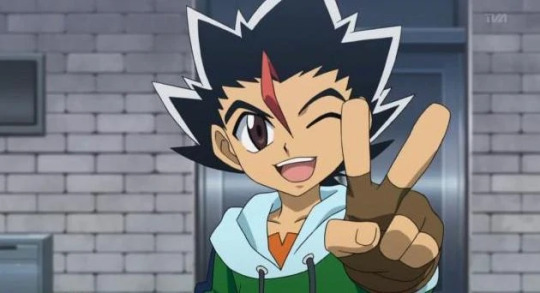
Masamune is lowest on this list because I don't hate him. I personally find his personality annoying but he is a well written character. He gets good development over the course of Metal Masters and Metal Fury and his friendship with King is really cute. However, he is completely full of himself. The difference between him and someone like Kyoya or Ryuga is that at least in comparison, Kyoya and Ryuga don't actually talk themselves up that much. They let their actions speak for themselves for the most part. They are absolutely arrogant and do brag but not to the same degree as Masamune, who is far less skilled in comparison. He also doesn't know when to shut up and was a really shitty friend to Toby and Zeo. However, at least the show calls him out for what he did to Zeo and Toby and makes it part of the plot. Still completely selfish and horrible though.
4) Johannes

Cat-boy thingy is creepy and I don't like him. He makes me uncomfortable. I don't have a reason really I just don't like the way he is. I’m a cat person too but the way he literally acts like a cat, meowing and sitting like one, is just weird. He’s also just some annoying boring villain underling, like Jack or Reiji without the brainwashing and sympathetic backstory, which spared the two of them from this list by the way. I may not like either of them but they are interesting to talk about and I get why other people like them. Johannes meanwhile is just there to get in the way. He doesn’t do anything interesting he’s just weird and annoying to me. Tetsuya is the same way to me by the way and I could’ve put either him or Johannes on this list.
3) The Garcias
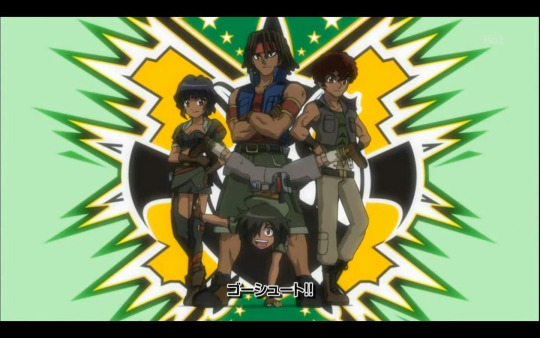
I'm lumping this entire family together because while I have separate small reasons for hating them individually, I hate all of them for the same big reason: I hate their attitude. They act like they're better than everyone else because they apparently "suffered more." First of all, suffering is subjective. Saying that one person has suffered more than another diminishes their suffering and is just arrogant. Yes, the Garcias live in poverty in a harsh neighborhood. They had a hard life and are trying to get out of it but that doesn't excuse them being obnoxious cheaters. I hate how they act like no one else has suffered more than them when LITERALLY EVERYONE ON GAN GAN GALAXY IS HORRIBLY TRAUMATIZED. Besides Masamune at this point but he didn't get out of season 2 unscathed. Meanwhile, the rest of them were at Battle Bladers. They all had to watch their friends get murdered by Ryuga or tortured by Reiji. Tsubasa was one of the people who had to battle Ryuga and came out of it infected with dark power, hurting himself and his friends. Meanwhile, Yu was manipulated and taken into the Dark Nebula and later kidnapped when he tried to leave. Don't even get me started on Gingka. I HATE hearing these know it all Garcias talk about how bad they've had it compared to the characters I've seen get traumatized for the past 70+ episodes at that point. It makes me not give a shit about their suffering because they're flaunting it and using it to excuse their frankly obnoxious and disgusting behaviour. Even Reiji, Jack, Damian, and Ryuga didn’t do that. Ryuga and Jack even admitted their mistakes later in the series with Ryuga especially taking actual steps to better himself. Meanwhile the Garcias stick to their bullshit philosophy to the end, even after it was proven wrong. They’re not any better in Fury either. They pretend to be fighting to manipulate Zeo and Toby to help them just to try and win a battle. It’s just frustrating to watch. Meanwhile, as individual characters, they still annoy the shit out of me. Enzo is an annoying brat that constantly repeats the same phrase over and over, which gets really annoying really fast, Selen's tactics make her battles against Masamune and Gingka frustrating to the point of boring, and Argo is an over the top borderline psycho, and not in a fun way. I don't have a specific reason to hate Ian but I don't really like him either so he gets lumped in with the rest of his siblings, since they all have similar attitudes. They also made Shogun Steel even more of a pain to watch.
2) Ryo Hagane

My reasons for this are mostly in Metal Fusion. He allows his teenage son to believe he's dead for reasons he claims are righteous, all while using this lie to justify hurting his son. Gingka's point counter being broken does drive him to take things seriously and push himself to fight harder to get into Battle Bladers. That is important to the plot and I won't deny that. But did it have to secretly be his dad who broke it? No. It could have been any random person, it could have been Tetsuya. Having his dad do it is an act of abuse, not to mention theft and property damage. I know no one gives a shit about the law in Beyblade but this is still messed up. I don't like the twist that Ryo lives but he does give Gingka semi-important information in the final episodes of Fusion and I might have been able to stomach this twist a little more if Ryo hadn't broke Gingka's point counter. That was a step way too far for me. I still wouldn't have liked Ryo though because allowing his teenage son to think he was dead is still messed up. He's also a terrible director. It frustrated me so much to see him force the Japanese and African teams to battle despite nearly all of them not being well enough to battle because they don't want to "show favouritism." How the fuck is it showing favouritism?! You shouldn't be making any teams fight when they're injured! It's not "showing favouritism" it's common decency. Gingka and Kyoya shouldn't have been allowed to battle when they were in such poor condition and Ryo was being both a bad director and a bad father by forcing them to battle. It seems like a small thing but it makes me hate Ryo even more than I already did. In short, Ryuga was right: "l always knew that your old man and his bey were second rate."
1) Rago
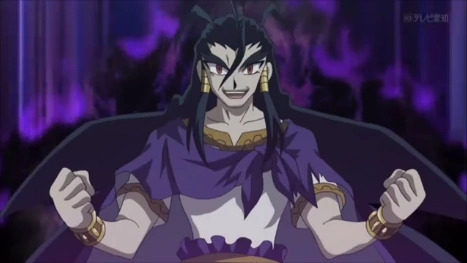
He killed Ryuga. That's it. What, you wanted an essay? Do I really need another reason? Well, he's also a one note villain without any traits to make him stand out among the other power-hungry villains of the series. He could have been replaced by a robot and his impact on the plot would have been the exact same. He's as boring and lifeless as a plank of wood. People say the new characters in Fury are boring. In this one case, I agree. This series has no excuse. Ryuga in season 1 was an excellent nuanced villain even though he and Rago's motivations were technically the same: power. Ryuga however had charm, he was scary, his greed for power began to physically control him by the end, giving us a hint of depth to a previously one note psycho. Doji was effective through his plans and presence in season 1, even Ziggurat had more to him than this "Rago" bitch. Ziggurat had an interesting plan and brainwashed children, Rago is just nothing. He does nothing interesting or memorable and the only reason I remember his name at all is because the one memorable thing he did was murder Ryuga. That alone wouldn't be enough to justify saying he's the worst character in the series but the fact that he's also a lazily written villain seals the deal for me.
Okay, there’s my list. Again, I like way more characters than I dislike and if you like any of these characters, that’s fine. I know for a fact Masamune, Johannes, and the Garcias have fans and while I don’t really understand why in the case of those last two, I can respect that opinion.
#beyblade#beyblade metal fight#beyblade metal saga#masamune kadoya#johannes beyblade#oh god time to tag every garcia#enzo garcia#selen garcia#ian garcia#argo garcia#ryo hagane#rago beyblade#nemesis beyblade#first time I watched Fury I thought Rago's name was Nemesis#he was just that forgettable#now I remember him as the murderer of my favourite character#and I hate boring villains so... yeah#rago kind of reminds me of thanos#both monologue non-stop and killed my favourite characters in their series#at least Rago's plan wasn't as stupid as Thanos's#and Ryuga's death actually meant something to the story#and made sense with his character#still my list my rules
26 notes
·
View notes
Text
Celebrate the Olympic Spirit
Sure, the Olympics aren’t a holiday, per se, but the every-four-year, or two if you count both Summer and Winter editions separately, massive international sporting events sure seems like a reason to celebrate, especially given their recent, unprecedented delay. And what better way to get into the Games mood, than by watching a sports movie?
Here are my favorite motivating, inspirational, and aspirational tales of athletic derring do…
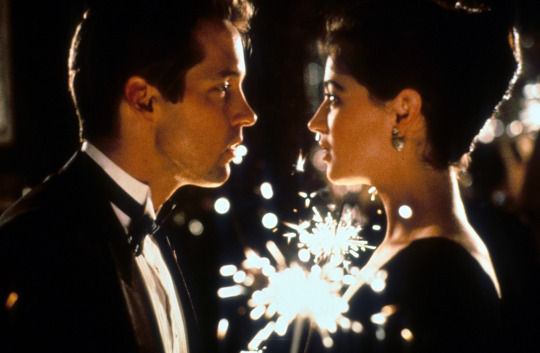
Favorite Sports Movies
The Cutting Edge (1992) - This figure skating romance was released around the 1992 Olympics, and actually name-checks that year's winter host city, Albertville, more than once. It's not good in the traditional sense of great storytelling or athletic veracity, but I loved it so very much I saw it three times in the theater as a teen. Watching it at some point during every Winter Games is a tradition for me so, yeah, I can’t help it, I love this silly sports movie/romance, which also features a bit of holiday feels.
Wimbledon (2004) - It's a rom-com. It's a sports movie. It's a rom-com sports movie that really should be better known. Notting Hill but set at tennis' best-known event. Paul Bettany and Kristen Dunst have surprisingly great chemistry, and there's more sports-related tension than you'd think.
Friday Night Lights (2004) - A football movie for people who don't really like football. a.k.a. 🙋♀️. The TV series it spawned is also brilliant (”Clear Eyes, Full Hearts,” indeed), and well worth a watch, but the original movie, starring Billy Bob Thornton, is, honestly, a masterpiece. Definitely Peter Berg's best work and the original book, written by Berg's cousin, Buzz Bissinger, is a great read.
Muriel's Wedding (1994) - You mean you forgot this Australian export, which made Toni Collette a star, was a sports movie? Yep, one of my all-time favorite movies, of any genre, this absolutely brilliant, ABBA-soaked comedy is not only a girls-night go-to, but also a stealth Olympic sport classic.
Remember the Titans (2000) - OK, football isn't in the Olympics, but it sure does make for a good sports movie setting. Even if this early 1970s-set story is most definitely Disney-fied, Denzel Washington, Will Patton, Ryan Gosling and a baby Hayden Panettiere really sell this sort-of true story.
Invictus (2009)-Rugby isn't an Olympic sport, or even one most Americans know much about, but this Matt Damon-led, Clint Eastwood-directed, based-on-a-true-story tale made me care about a sport I'd only tangentially knew even existed before watching.
Hoosiers (1986)-I grew up in Indiana so, by law, I have to include this basketball classic on any "best of" sports movie lists. Also, it actually is really very good.
Rudy (1993)-Ditto the above. But, again, it's hard not to root for Sean Astin (and Jon Favreau!) in this love letter to the Fighting Irish. Plus, there’s no better scavenger hunt task or TikTok challenge than going into a bar and convincing a patron to allow you to put them on your shoulders and march around chanting, 'Rudy, Rudy, Rudy.'
Miracle (2004) - Given how much more popular the Summer Olympics are, it's weird that the Winter Games seem to get all the good movies made about them, but this Kurt Russell-led true tale is another Disney sports movie classic.
McFarland, USA (2015) - Disney, and Kevin Costner, just really know how to make a sports movie, damn it! This movie made me care about cross country for which it, too, could have carried the title Miracle.
A League of Their Own (1992)-The best baseball movie ever. Yeah, I said what I said. Tom Hanks, Geena Davis, Lori Petty—even Madonna and Rosie O'Donnell are making it work. 1992 was a weirdly great year for sports movies.
Moneyball (2011) - A movie about baseball, and math, and yet it's also great, I swear. In addition to all of the above, it's also a stealth Christmas movie and maybe Chris Pratt's best non-Marvel, movie role.
Creed (2015) - This surprisingly effective Rocky reboot starring Michael B Jordan as Apollo Creed's illegitimate son has spawned its own movie series which, in many ways, exceeds the original Rocky franchise.
Rocky Balboa (2006) - Maybe it's because I was a toddler when the original Rocky came out, so only saw the ever-worse sequels as a kid, but this mid-aughts return to the character for Sylvester Stallone, as both writer and actor, is a triumph.
Eddie the Eagle (2016) - That Hugh Jackman features in as many movies (spoiler alert) on this list as Kevin Costner surprised me, too. This story of the English ski jumper who became infamous for being, well, less than golden, is one of those non-Olympic triumph stories that really works. If you're going to watch one underdog-at-the-Games movie, I definitely prefer this this to the more ubiquitous Cool Runnings.
Love & Basketball (2000) - Only because I'm an anglophile is this great, chemistry-filled Sanaa Lathan and Omar Epps college basketball romance not my favorite sports-movie-meets-rom-com.
I, Tonya (2017) - Margot Robbie and a nearly unrecognizable Sebastian Stan are perfectly cast in this sarcastic, highly stylized look at the Tonya Harding scandal.
Pride (2007) - Apparently I like this swimming movie, which I think almost no one saw, better than critics, but I found this 1970s-set, Terrence Howard-Bernie Mac-starring story of inner city kids excelling in the pool emotional and entertaining.
Field of Dreams (1989) - This Kevin Costner magical realism baseball classic is often goofy and imminently tease-worthy and yet…It also works. Maybe it's no surprise that someone who loves cheesy Christmas movies as much as I do would have a soft spot for Field of Dreams.
42 (2013) - Chadwick Boseman is absolutely fantastic as legend Jackie Robinson. One of those movies that's ostensibly about baseball, but is really about so much more, except not in a pretentious way.
Race (2016) - Before Jason Sudeikis was Ted Lasso, he was famed track coach Larry Synder in this Jesse Owens biopic that is far from perfect, but still important. Plus, I honestly don't think Stephan James got enough credit for his relatively nuanced portrayal of Owens.
Goon (2011) - This overlooked gem starring Sean William Scott as a semi-pro hockey player whose main skill is his ability to take, and dole out, a beating, is surprisingly great.
Real Steel (2011) - This is a robot-boxing movie starring Hugh Jackman that is basically Rocky meets Over the Top—and yet it's actually really good. Yeah, I was surprised, too.
Forget Paris (1995) - OK, so maybe Billy Crystal playing an NBA referee doesn't really make this a sports movie, but it does begin and end (spoiler alert) at real NBA games, and I will die on the hill that this rom-com co-starring Debra Winger is wildly under-rated.
Bend it like Beckham (2002) - This girl-power sports movie has some highly questionable romantic dynamics (the coach is their love interest???) but this Parminder Nagra-Keira Knightley movie is also a heckuva sports movie and an inspiring immigrant story.
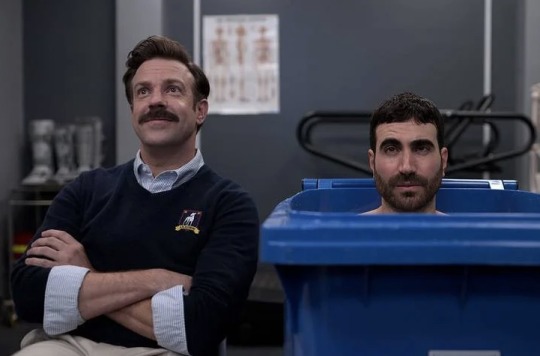
Bonus Pick: The Apple TV+ series Ted Lasso is one of the best things I watched in 2020, and I'm sure of that, because I watched it twice since, just to be sure. Jason Sudekis is absolutely perfect as an American college football coach taking over a UK Premier League team. This sweet show with a heart of gold is smart, funny, and absolutely impossible not to love—even for a cynic such as myself.
More Sports Movies Worth Watching
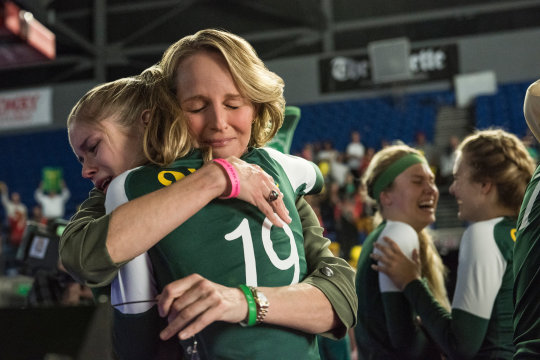
For someone not very into sports, I am, apparently, into watching movies about sports, so while not a comprehensive listing of the entire, vast genre, here are a few more suggestions I personally think are worth watching.
The Miracle Season (2018) - This movie about high school volleyball champs whose star player dies suddenly stars Helen Hunt and is a lot better than you'd think based on its tiny budget and, honestly, fairly small story. Just missed making my Top 25.
The Way Back (2020) - This Ben Affleck as a drunken high school basketball coach movie is a lot better than expected. Released just as the pandemic kicked into high gear, it was overlooked last year, but worth seeking out.
Fighting with My Family (2019) - Does it count if it's a show, not a sport? Either way (but that's why this isn't in my Top 25), this stealth Christmas movie/love letter to the WWE is a lot better than it ever needed to be thanks to some really great performances from Florence Pugh, Lena Headey and directer Stephen Merchant. Even The Rock reins it in.
Warrior (2011) - You couldn't pay me to watch an actual UFC bout, but this Tom Hardy story of (literally) battling brothers is incredibly compelling and well done.
Win Win (2011) - This movie isn't really enough about wrestling, even though its ostensibly centered around the sport, to make it into my Top 25, but it's still really good, and Amy Ryan gives an outstanding performance.
Fever Pitch (2005) - Drew Barrymore and Jimmy Fallon star in this remake of a UK film whose ending they had to shift when the Red Sox unexpectedly won the World Series.
Fever Pitch (1997) - This Colin Firth-starring, Arsenal-centered original is much smaller, more realistic and arguably better than the big budget Barrymore-Fallon redux.
We are Marshall (2006) - A real-life sports tragedy made into a sports-movie tearjerker starring Matthew McConaughy. And my tears were very much jerked by the end.
Coach Carter (2005) - Samuel L Jackson plays real-life basketball coach Ken Carter and, because it's a Disney movie, doesn't use the F-word even once. Now that's a feat worthy of its own sports movie.
Invincible (2006) - Yes, it's Mark Wahlberg, and another based-on-a-true-story, Disney sports movie that hits all the cliches, but dang it, that works on me. It just does.
Glory Road (2006) - If you're sensing a theme with me and Disney sports movies…Well, you're not wrong. This look at the first all-Black starting lineup at the 1966 NCAA Final Four does, unfortunately, center white coach Don Haskins, played by Josh Lucas (though I always mis-remember it as Josh Charles), making the important story it tells less than what it should be, but it still mostly works.
Million Dollar Arm (2014) - Admittedly one of the lesser Disney sports movie entries, and another that centers a white guy in a film mostly about people of color (not a great look), this Jon Hamm movie about a scout seeking an Indian cricket star who can make it in the Major Leagues still mostly worked for me.
The Mighty Ducks (1992) - One of the few movies on this list aimed directly at kids, this beloved peewee hockey saga actually is cute, and mostly does hold up.
Cool Runnings (1993) - Kind of shocked this movie that is part White Savior-movie and part-wacky kids movie essentially making fun of a real group of athletes of color came out in 1993 and not 1973, but the earnest charm of John Candy and a general Disney gloss keep this from being totally unwatchable and mostly just mildly, rather than extremely, offensive. Not really recommending, but feels like it belongs on an Olympic movie list.
Nadia (1984) - This made-for-TV, mostly true biopic, starring Talia Balsam as Nadia Comaneci, was a Disney Channel staple in that network’s early days.
Munich (2005) - It's a movie with the Olympics very much at its heart—namely the 1972 Israeli athlete hostage tragedy—that isn't really about the Olympics at all, but this Steven Spielberg-directed movie about national revenge is compelling, if problematic if you think about it for too long.
American Anthem (1986) - Is this Mitch Gaylord-Mrs. Wayne Gretzky (a.k.a Janet Jones) starring movie good, realistic and/or well-written? No, no and none of the above. But did I still watch it 8,000 times as a kid on HBO? Yes. Yes, I did.
Men with Brooms (2002) - Once, on a business trip to Canada, my husband was stuck in a hotel that only got three channels, and one of them always seemed to be showing curling, which actually got him weirdly into this obscure sport. This movie wasn't quite as fun as I hoped, but it's still a mostly charming, if slight, Canadian classic.
Unbroken (2014) - The harrowing and incredible real-life story of Louis Zamperini deserved better than this Angelina Jolie-directed movie delivered, but it's still a serviceable version of a worthy tale.
Chariots of Fire (1981) - I remember being bored out of my mind by this movie trying to watch this movie on cable as a kid, but no denying that, if nothing else, the score is iconic and indelibly linked to sports-movie magic.
Without Limits (1998) - Jared Leto’s Prefontaine beat this one to the theaters, but this Billy Crudup-starring film is the better of the two movies about the life of running pioneer Steve Prefontaine. There’s also a 1995 documentary, Fire on the Track: The Steve Prefontaine Story.
Personal Best (1982) - Mariel Hemingway’s story of ambition at odds with love, is a sports and LGTBQ+ classic.
Olympic Dreams (2019) - The story of how this small, meandering movie was made during the 2018 Winter Games is, unfortunately, more interesting than the movie itself, but there is some charm in watching Nick Kroll as an Olympic dentist making his way through the real Village, while interacting with real athletes.
Foxcatcher (2015) - This excellently-acted story is more true crime than sports inspiration, but if you're seeking a look at the dark side of the Games—and don’t want to turn on a doc like Athlete A—this is very dark tale indeed.
Seabiscuit (2003) - Every great athlete deserves to have their story told.
Any Given Sunday (1999) - Oliver Stone and Al Pacino take on pro Football. 'Nuff said.
The Replacements (2000) - I mean, the movie isn't amazing, but Keanu Reeves is super charming and Gene Hackman is always worth a watch.
The Program (1993) - Another bit of a dark-side-of-football take, worth it if only for the fantastic cast: James Caan, Halle Berry, Omar Eps, Joey Lauren Adams.
Everbody’s All-American (1988) - Not a movie I particularly love, but this Dennis Quaid-Jessica Lange football story that spans decades has always stuck in my memory.
Bull Durham (1988) - Just let Kevin Costner play actual baseball already.
7 notes
·
View notes